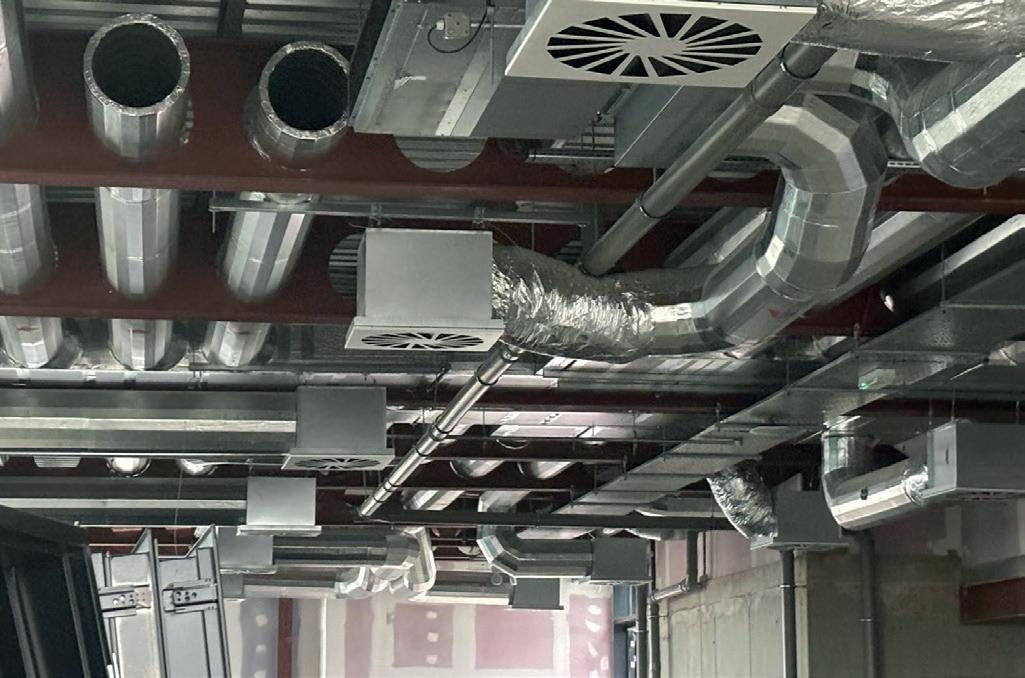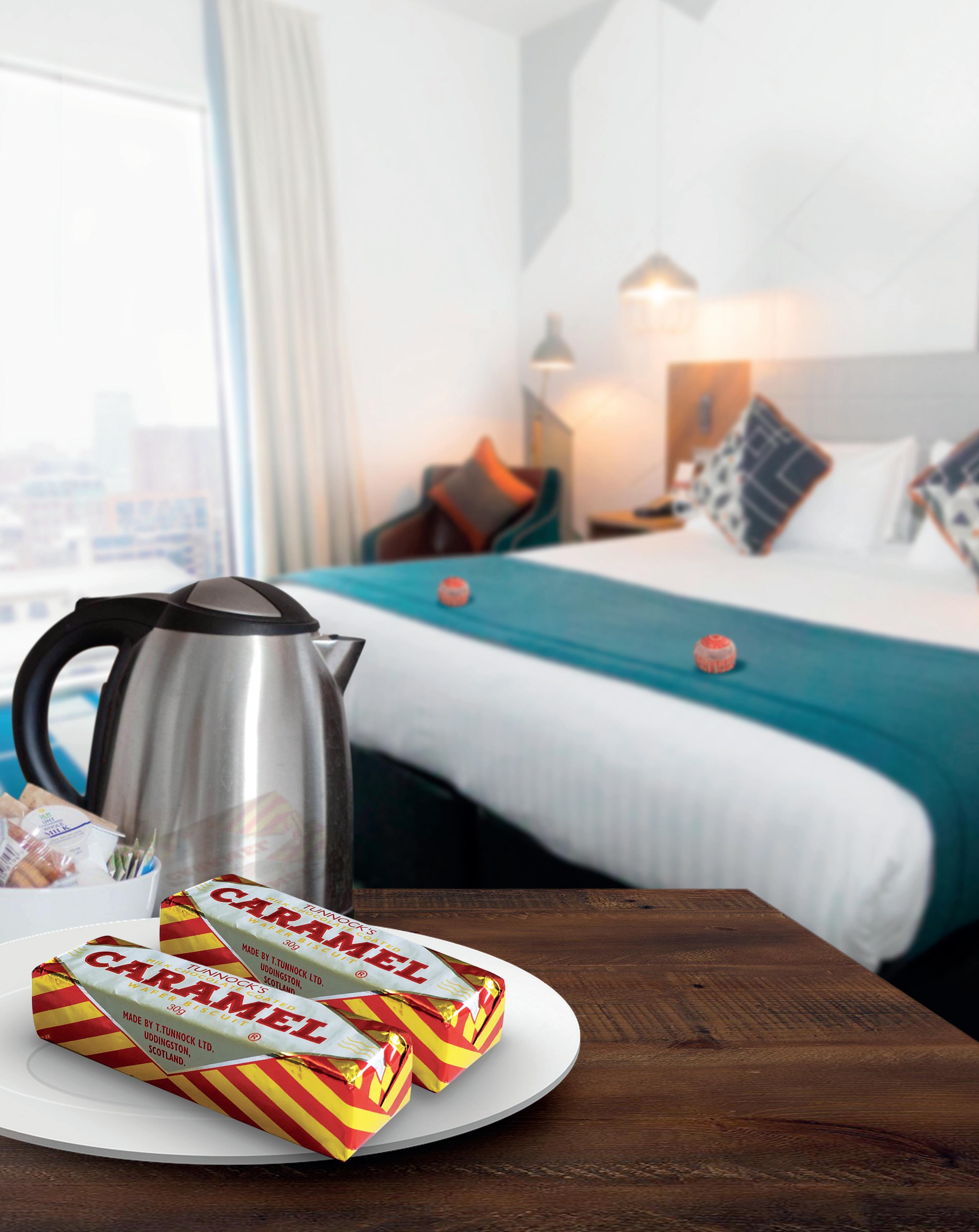HOTEL SCOTLAND



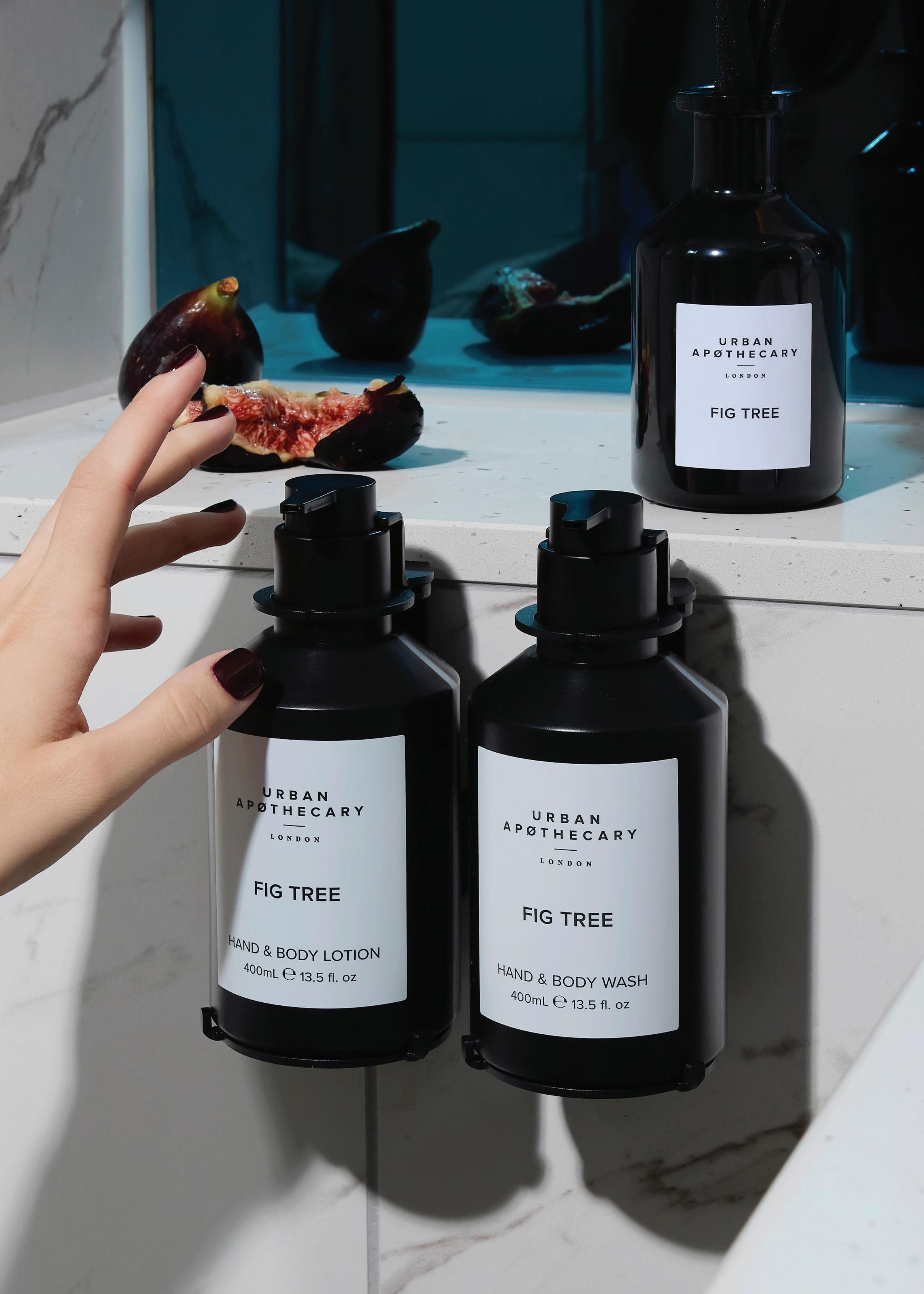
Discover VANITY GROUP’S Designer Playground


I’m finishing off this month’s magazine as the weather has once again turned glorious -although it was equally sunny when I caught up with Will Oakley at Cameron House. Mind you, he’s used to good weather, having spent much of his career working in the Caribbean. Find out what he has to say on page 16.
Congratulations to Calum Ross, GM at the Hilton Hotel on Glasgow’s William Street, who was presented with The HIT Industry Award at the charity’s annual dinner. Some of the photos are on page 15.
We also take a look at What’s on the Market - and there was no shortage of candidates for this feature. But we’ve selected just a few that caught my eye.
In addition, we explore the new food and beverage offerings at Brig o’Doon and The Old Course, St Andrews, as well as the fabulous new spa at Gleddoch House.
Until next month.
Susan Young Editor


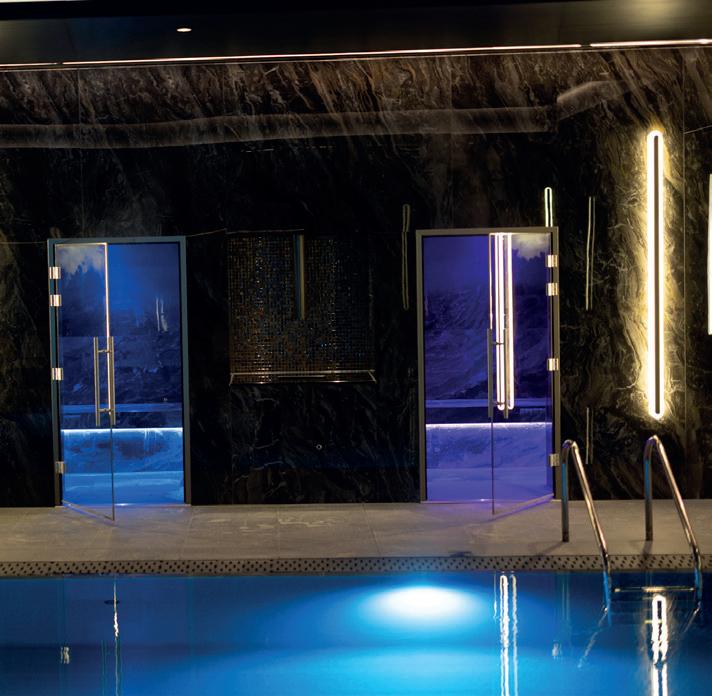
susan@mediaworldltd.com
@hotel_scotland hotelmagazinescotland.co.uk
Caledonian Leisure, the business behind Caledonian Travel and UKBreakaways, has confirmed the acquisition of the 63-bedroom Dreadnought Hotel in Callander.
The purchase of the property, which will be rebranded as The Caledonian Thistle Hotel, was completed in partnership with the company’s investors. It adds to Caledonian’s growing portfolio under The Caledonian Hotel Collection, which already includes hotels in Torquay, Blackpool, Scarborough and Arrochar.
Graham Rogers, Managing Director at Caledonian Leisure, said, “After the success of The Caledonian Hotel Collection in Torquay, Blackpool, Scarborough and Arrochar, we’re delighted to welcome another hotel to our family. With sector-leading customer review scores and rising demand across our brands, this investment is a key step in strengthening our year-round offering in Scotland.”
A refurbishment is now underway to upgrade the hotel’s bedrooms, refresh public spaces and improve the entertainment facilities. The hotel’s bar will retain its original name, Macnab’s Bar, while the restaurant will be
reintroduced as The Dreadnought Restaurant, in tribute to the building’s heritage.
David McDonald, Finance Director at Caledonian Leisure, said, “Callander is a wonderful base for customers looking to explore with so many outstanding and beautiful areas within easy reach of this delightful Scottish town. We’re proud to invest in the local area, and by welcoming customers all year round we’re pleased that we’ll be making a contribution to the area’s economy too.”
He added, “Right now, we’re actively recruiting local people to deliver exceptional hospitality as we prepare to reopen the hotel this summer after this extensive refurbishment project.”
The hotel is expected to reopen at the end of July and will operate all year round, aiming to appeal to both coach-inclusive and self-drive customers.
As part of its wider strategy, Caledonian Leisure recently invested £2.4 million in 10 new touring coaches, further enhancing its fleet as it continues to grow its leisure offering across the UK..
Scotland’s oldest inhabited castle, Dalhousie Castle in Bonnyrigg, which was recently sold to a private investor from Dundee, has announced the start of a multimillion-pound development.
The historic 800-year-old property, which sits along the River Esk, will benefit from a £5 million renovation project that includes the expansion of guest accommodation from 35 to 38 rooms, a new bar lounge in the Alexander Suite, a refurbished all-day dining space, a single cask whisky cellar, and a remodelled library. ISA Architects have been appointed to lead the works, with completion targeted for late summer 2025.
Operationally, the castle continues to be managed by 7 Hospitality Management, who have announced the appointment of Philip Egan as the property’s new general manager.
Commenting on his new role, Egan said, “It’s an honour to be joining Dalhousie Castle during this exciting time of transformation. The castle is not only a place of incredible history, but also of enormous potential. I’m excited to work with the team to deliver a refreshed and reimagined experience that honours its legacy while looking firmly to the future.”
Conner Hutchison, Head of Brand and Communications at 7 Hospitality Management, added, “We are thrilled to welcome Philip to the 7 Hospitality family. With a property as historically significant and unique as Dalhousie Castle, it’s vital to have a leader who understands both tradition and transformation. Philip’s depth of experience and vision will be key in bringing our £5 million refurbishment project to life and enhancing every aspect of the guest journey.”
The investment marks a significant milestone in the evolution of the castle, which aims to position it as a distinctive destination that celebrates heritage.

Cairn Lodge Hotel, near Gleneagles, the boutique 10-bedroom lodge and restaurant in Auchterarder has been put up for sale.
It’s Garden Room restaurant is a previous winner of the Restaurant of the Year at the Scottish Pub & Bar Awards, with judges praising the venue for “its all-round high performance from the welcome they received to the food quality and fantastic customer service.”
Set within a private estate and offering development potential, it is being marketed by Fine and Country Scotland as a premium opportunity...
The Larbert-based business, Mrs Tilly’s, known for its traditional sweet treats including Tablet, Fudge and Macaroon, has launched a new mini bar format of its popular Tablet and Fudge, aimed at the hospitality market.
The new individually wrapped mini bars are designed for use in hotels and are already being picked up by a growing number of wholesalers across Scotland.
Mrs Tilly’s Managing Director Blair Paterson said, “We are excited to launch our new range of mini Tablet & Fudge bars to the market. We see these as a great option for a number of hospitality settings and feel that they can offer a bit of variety versus some of the more established products typically used in those areas.”.

Minister for Business Richard Lochhead visited Crieff Hydro recently to see the results of the group’s £5million investment in a complete dining refurbishment for the iconic resort.
Mr. Lochhead joined CEO Stephen Leckie at an event for the contractors, suppliers and partners involved in the landmark project, attended by more than 250 guests. The event was also attended by Jim Fairlie, Minister for Agriculture and Connectivity, and Xander McDade, Provost of Perth & Kinross.
Business Minister Richard Lochhead said, “This is an important milestone for a business synonymous with Scottish tourism. Crieff Hydro is an important economic
Sonas Collection and Skye Luxury Touring have launched a new four-night luxury package aimed at high-end visitors looking to explore Scotland’s west coast. The Sonas VIP West Highlands & Islands Experience takes in Oban, Mull, Glencoe and Skye, combining five-star hospitality with chauffeur-driven touring and private helicopter travel. The package is the result of four years of collaboration between the two companies.
Anne Gracie-Gunn, owner of the Sonas Collection, said, “When we first opened Toravaig, my late husband and I often took guests sailing around the Hebrides. This new experience brings us back to that idean- sharing the islands with people who want to explore in a meaningful way.
“We’ve grown from a single property into a small group of family-run hotels. With the addition of Knipoch House and recent investment in the business, we can now offer a consistent experience across Oban and Skye.” Skye Luxury Touring provides access to less-visited locations, including filming sites, castles and distilleries. Managing director Craig Murray said, “Combining our local driver-guides with Sonas properties creates a new way to explore this part of Scotland. It’s a product built around comfort, access and insight.”
Employee-owned Auchrannie Resort at Brodick on the Isle of Arran has reported a 5 per cent rise in occupancy and forward bookings this year compared to 2024. Management attributes the uplift to the arrival of MV Glen Sannox on CalMac’s Troon–Brodick route, which began service in 12 January.
The four-star resort, which operates two hotels, lodges, leisure facilities and a spa, said the improved ferry service has made travel to Arran easier and more reliable for visitors.
According to the Fraser of Allander Institute, more frequent and reliable sailings are vital to Arran’s economy and could translate to daily business boosts estimated in the tens of thousands of pounds..
driver in the region, providing investment, jobs and bringing new customers to local businesses.
“I look forward to watching the business flourish for decades to come and commend their leadership and dedication to top-rate tourism and hospitality.”
Stephen Leckie said, “This landmark project could not have been achieved without the hard work and passion of our entire team and the partner businesses who helped bring it to life. This is the most significant investment we have made in decades and marks the start of a new era in Crieff Hydro’s 157-year history. This project, and our ongoing efforts to continually better the experience we offer to our guests, underscores our commitment to championing Scotland’s world-class hospitality sector.”
East Haugh House has been purchased by Apex Hotels Ltd who also own the Pine Trees Hotel in nearby Pitlochry.
The former hotel had been turned into a residential house in 2022 but Apex is now seeking planning permission from Perth & Kinross Council to turn it back into a hotel.
Alistair Letham, of Graham + Sibbald, who marketed the property jointly with Rettie & Co, said , “The East Haugh House offers a fantastic opportunity to reestablish East Haugh as a quality destination.”
Formerly operating as the East Haugh House Hotel, the 17th-century country house, has 7-bedrooms. a collection of public spaces as well as a separate 4/5-bedroom annexe and a three-bedroom cottage when it operated as a hotel it had 12 bedrooms and a restaurant.
It is set within approximately two acres of private grounds and enjoys a prime location close to the A9, Scotland’s main north-south artery.
While the final sale price remains undisclosed, the property had been marketed at offers over £750,000..

Boutique hotel operator Bomporto has partnered with Scottish design and interiors brand Anta to convert a B-listed former theatre on Rose Street, Edinburgh, into a new hotel.
The mixed-use development will see the upper floors of the building transformed into visitor accommodation. A rooftop bar is also proposed as part of the plans while the ground floor will house new Anta retail premises.
Originally built in 1912 as an Edwardian Baroque chapel, in recent years the property has been the subject of several development proposals. Previous plans have stalled, primarily due to restrictions around preserving the building’s main hall. The current application outlines a new approach.
A planning statement submitted with the proposal said, “If the sanctuary space were directly accessible from street level, converting it into a hotel lobby or reception area would be more practical. In its current location, the space occupies too much floor area and would impede the economic viability of the development.”
The applicants say the project requires substantial investment and a full internal retrofit to meet modern standards. The development would involve taking the interior back to the building’s external shell . The application is currently under review with City of Edinburgh Council..
Lloyds Edinburgh Park HQ could relaunch as 113-bed hotel
A former Lloyds Banking Group head office at Edinburgh Park could be transformed into a 113-bed hotel under new plans submitted to the City of Edinburgh Council.
The vacant four-storey building, known as Pentland House, sits on Lochside Avenue and has been empty since 2023. It was put up for sale earlier this year and now looks set for a new chapter, with proposals to convert the office block into a serviced-apartment style hotel, complete with reception, gym, meeting suite, laundry area and breakfast space.
The developer behind the application, W. Gardner-Young, is proposing minimal changes to the building’s exterior but plans to fully reconfigure the internal layout to suit long and short-stay guests. .
Built in 1991, Pentland House once served as Lloyds’ Scottish HQ.

Scotland’s hoteliers faced a challenging April as employment costs climbed and room rate pressures mounted. Yet despite the squeeze, the sector reported stronger profits, outpacing performance elsewhere in the UK, according to the latest RSM Hotels Tracker.
The data, compiled by Hotstats and analysed by RSM UK, shows hotel payroll in Scotland rose year-on-year from 31.7% to 32.4% of revenue. Across the UK, payroll costs jumped from 31.6% to 33.3%, reflecting the impact of increases to both the National Minimum Wage and employers’ National Insurance contributions.
Room rates told a mixed story. Scotland’s average daily rate (ADR) edged up from £125.57 to £126.33 compared to the previous April, while the UK saw a slight fall from £138.29 to £137.54.
Revenue per available room (RevPAR) in Scotland climbed by 3.8% year-on-year to £97.12, with the UK recording a 3% increase. Operating profit margins in Scotland also improved, rising from 28.2% to 30.3%. In contrast, the UK’s gross operating profit dipped from 31.8% to 30.1%, suggesting increased costs outstripped revenue growth.
Stuart McCallum, partner and Head of Consumer Markets in Scotland at RSM UK, said, “Scotland’s hotel sector was hit with a double whammy in April as hoteliers battled with a rise in employment costs combined with
deflationary pressure on room rates. However, they still managed to offset the increase in employment costs and generate a rise in profits, against the downward trend seen in the wider UK market, which saw a fall in daily rates and loss of profits.
“Despite last month’s bump, and higher overheads in April, it seems the industry is managing these cost pressures well while maintaining its large workforce. Much of Scotland’s hotel footfall comes from international tourists seeking luxury stays, with hotels continuing to invest in their facilities and services to offer visitors a range of experiences including fine dining, whisky tasting and bespoke packages.
“We’ve seen a shift in behaviour from tourists visiting Scotland as they trade up their accommodation for more high-end stays, with hoteliers mirroring this trend to focus on quality over cost-cutting. Sites such as Cromlix House and The Glenturret have enhanced their offerings with exclusive whisky tastings, excursions and private dining, which aside from boosting Scotland’s economy outside of Edinburgh, will grow revenue and compensate for extra payroll costs.”
He added, “The challenge is now sustaining this momentum given the current economic and geopolitical climate. The UK government’s plans to tighten immigration rules could impact staffing levels due to the sector’s reliance on seasonal and international workers.”.

This month filming begins on the Isle of Ulva for a new six part BBC Scotland series called Banjo and Ro’s Grand Island Hotel .
The series follows designer Banjo Beale and his husband Ro as they attempt to turn the crumbling Ulva House into a boutique hotel.
The island mansion on the Isle of Ulva, which has a population of 14, 16 including Banjo and Ro, is a Regency-era property, which had fallen into disrepair until it was bought by the local community in 2018. Now Banjo and Ro hope to transform the fortunes of the crumbling house and the island community.
The six-part series will chart the challenges of restoring a historic building in a remote location, with limited budget, unpredictable weather and island infrastructure all part of the story. Filming will continue through to October, with the programme expected to air in 2026.
Along the way, the couple - who have relocated to Ulva along with Grampa the dog as well as their chickens and pigs - will face the challenges of remote island life and a limited budget
but these two dreamers are determined to transform the crumbling mansion into a stunning destination hotel.
Says Banjo, “This is my biggest project yet with an absolute nightmare of a client - myself. Ro and I have officially lost the plot. We’re going to try and rescue a crumbling, abandoned manor on the wild and windswept Isle of Ulva. With 16 residents, no roads and no clue how we’re going to pull it off, it’s going to be my boldest and muddiest adventure yet. There’ll be midges, madness, and hopefully a miracle or two.”
Banjo’s husband Ro adds, “I thought we were just here for a quiet escape, next thing I know, I’m knee-deep in filth, chasing pigs out of the hallway, and somehow in charge of sourcing vintage chandelier crystals from 1855. Banjo calls it a vision; I call it grounds for divorce.”
The project, set against the backdrop of Scotland’s growing interest in community-owned heritage and sustainable tourism, will be documented in full on BBC iPlayer and BBC Scotland. In the meantime, updates are being shared via Banjo Beale’s Instagram and the Grand Island Hotel page.
Banjo and Ro’s Grand Island Hotel is a Hello Halo production for BBC Scotland..
The W Edinburgh hotel has been sold by Nuveen Real Estate to Schroders Capital for an undisclosed sum. The sale comes 18 months after the 244-room hotel first opened in November as the brand’s debut property in Scotland.
Schroders Capital, the $99.3 billion (£73 billion) private markets arm of investment firm Schroders, has acquired the hotel under a longterm management agreement with Marriott International.
The W Edinburgh is part of the wider St James Quarter development, which includes a shopping centre and apartments. Nuveen has said the overall value of the development exceeds £1 billion.
The hotel spans three buildings, including

the 12-storey ‘ribbon’ building that houses a Sushisamba restaurant, a recording studio, spa, meeting rooms and a panoramic roof terrace. Accommodation also includes rooms in James Craig Walk, a listed terrace from 1775, and the newly built Quarter House.
James Macnamara, of Schroders Capital, said, “The addition of the W Edinburgh to our portfolio is hugely exciting, as we continue to identify top-tier hotel assets that can facilitate multiple ways to create value and offer significant long-term growth potential.
“Edinburgh is an attractive market for Schroders Capital and we look forward to working with the highly experienced and agile team at the hotel to ensure guest experience remains in line with the W brand quality and ethos.”
Ed Webb, Director of Development Management at Nuveen, added, “The completion of the sale of the W Edinburgh marks a considerable milestone for St James Quarter as the first transaction realises over a decade of planning and development to deliver a leading destination in the heart of Edinburgh and the completion of a vision shared by our investors.
“The hotel itself has become an iconic landmark within the city centre whilst also providing a best-in-class offering worthy of Edinburgh’s status as a global tourist destination.”.
Cameron Toll hotel plans approved as part of regeneration strategy
Plans for a new 109-bedroom hotel at Edinburgh’s Cameron Toll shopping centre have been approved, marking a key step in wider regeneration efforts at the site.
The hotel, which will be built on part of a former car park on Liberton Road, forms part of a broader plan to revitalise the centre. Designed by 3DReid, the development was praised by the planning committee for its sustainability features and street-level design, which it described as “a sustainable and well-designed development.”
Approval was granted subject to a revision that addresses the impact on neighbouring Dunedin School, which developer Hunter REIM has agreed to implement.
Hunter REIM Managing Director Andrew Moffat said: “We’re obviously delighted that the proposals were approved. I’d like to thank the committee and the council for the quality of the very considered debate. We’ll happily accept the condition to reduce the oversight of our neighbour Dunedin School and will continue to work in partnership with them and others to minimise any negative impacts during construction.”
Construction on the hotel is expected to begin in 2026, with completion scheduled for 2027.
Luxury Scotland, previously Connoisseurs Scotland, has added four new members to its group of independent hotels and hospitality venues. The new additions are Linn House in Speyside, Monachyle Mhor near Balquhidder, Kinloch House in Blairgowrie, and The Witchery by the Castle in Edinburgh.
The expansion increases the number of properties in the collection to 30 and strengthens its coverage across key regions including the Highlands, central Scotland and the capital.
Dorothy Welsh, Chief Executive of Luxury Scotland, said, “Each of these properties brings something unique to the Luxury Scotland portfolio and helps us extend our reach to more parts of the country.”
The Lochalsh Hotel, a landmark Highland property at Kyle of Lochalsh, has been sold to Edinburgh Portobello Hotels Ltd after three decades of family ownership.
Outgoing owner Murdo Macrae said, “It has been a privilege to serve guests from around the world and to be part of the local community. We believe that under new ownership, the Lochalsh Hotel will continue to thrive as a cherished Highland destination.”
Located on Ferry Road and boasting 47 en-suite rooms, a restaurant, and lounge bar, the hotel is known for its sweeping views over Lochalsh towards Skye. It was sold by CCL Property.
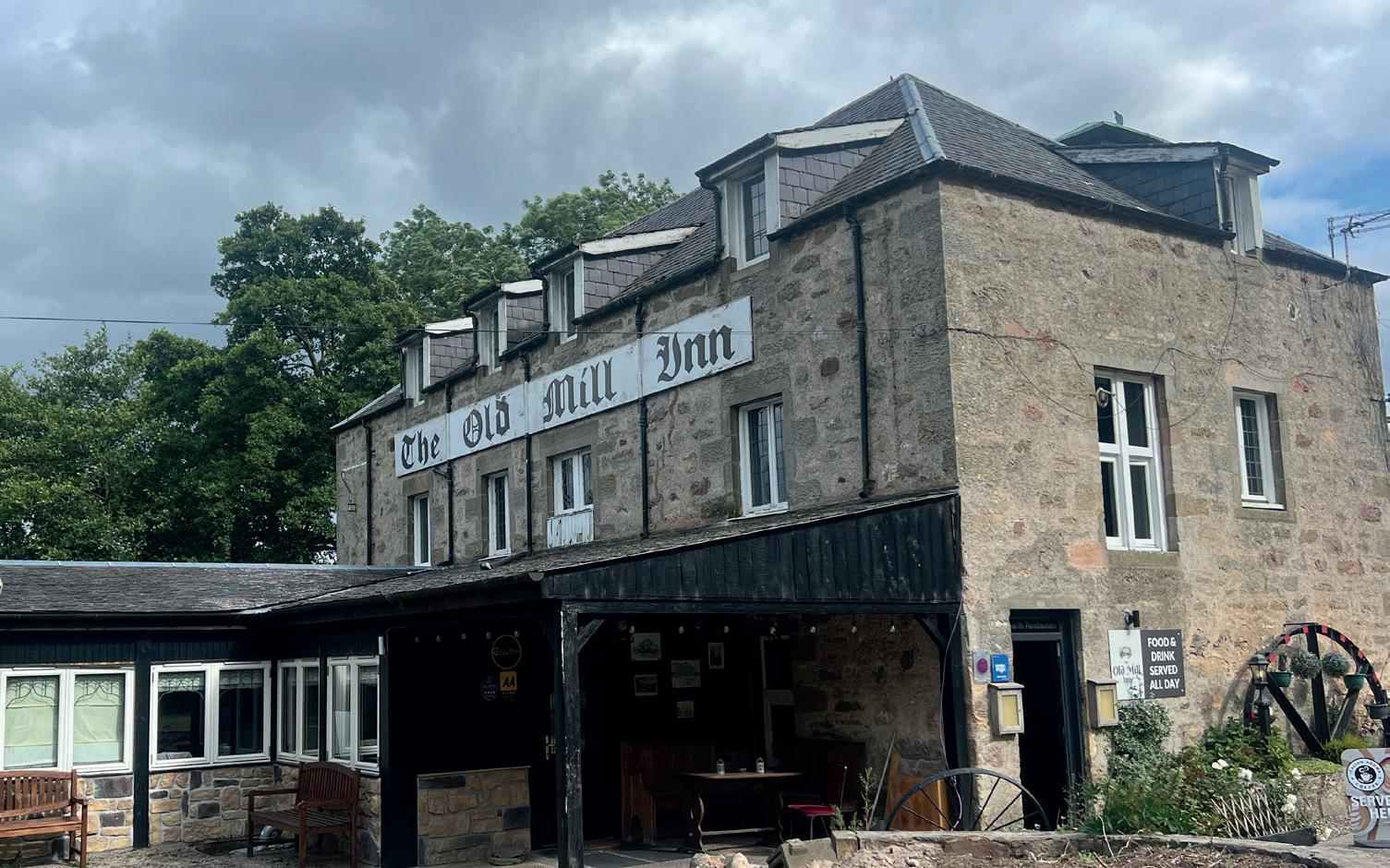
North-of-Scotland-based MacAli Group has opened the Old Mill Inn in Brodie, near Forres, between Inverness and Elgin which it bought in April.
It follows a major refresh,of the stone-built, five-bedroom property, returning the Inn to its roots as a country pub with comfort food, a well-stocked bar, a larger beer garden and a children’s play area. They also intend to develop the site as a venue for summer weddings and outdoor events and will submit plans to increase the number of guest bedrooms
MacAli Group CEO Mohammed Ali, who grew up in the area and remembers the Old Mill as a pub before it became a fine-dining restaurant, said, “We are very excited to welcome this new business to our portfolio. I have lived in this area all my life and have fond
memories from being young and knowing the Old Mill as being a pub and then seeing it move to fine dining. MacAli Group are going to bring it back to the old days of real pub food for all the family. We are a family-run business and we are proud to be bringing back more family-friendly venues across Scotland.”
The Inn has been closed since 2023 and first opened as a hotel in 2016 after extensive renovation, transforming the former mill into accommodation, restaurant, bar and owners’ quarters .
MacAli Group operates several properties across the north, including Poseidon’s Inn, Firth Hotel and Restaurant, Nairn Nights, Harbour Nights, MacRaj Indian Restaurant, West End Hotel, Taigh Mor, Crown Court Hotel, Harbour Rooms and The Silver Dollar.
The Holiday Inn Dumfries has changed hands as part of a three-property hotel portfolio acquired by Estee Group in a deal managed by Savills and marketed at a guide price of £14 million.
The deal marks the groups first acquisition in Scotland. It currently has a number of hotels throughout the rest of the UK.
The Dumfries hotel is one of three regional assets purchased from FS JV License Ltd. The other properties include the Holiday Inn Darlington North and the Mercure Sheffield Parkway. Together, the three hotels offer a total of 227 bedrooms.
The sale, known as Project License, reflects continued investor interest in branded, regional hotels. The Dumfries site in particular has been highlighted for its location within a historic estate and access to local visitor traffic.
Steven Fyfe, director at Savills, said, “Project License provided an excellent opportunity to purchase three well-located hotels with strong brand identity and considerable future asset management potential. We are very pleased to have completed the deal, achieving a strong price on behalf of our client.”
Marriott International has announced a major expansion in Edinburgh, signing a three-hotel deal with local developer and operator Chris Stewart Group. The agreement includes two rebrands and a new-build addition, boosting Marriott’s presence in one of Europe’s most competitive city markets.
From 1 July 2025, The Edinburgh Grand will become part of The Luxury Collection**, marking the brand’s debut in Scotland. Set in a restored neo-classical building on St Andrew Square, the hotel offers high-end, residentialstyle living in a landmark location.
“The addition of The Edinburgh Grand to The Luxury Collection is particularly significant, bringing the brand’s celebrated blend of heritage and high-end hospitality to Scotland for the first time,” said Paul Thomas, Vice President, International Hotel Development, Marriott International – Europe, Middle East & Africa. “We’re proud to partner with Chris Stewart Group, whose local insight and commitment to excellence align closely with our vision.”
Also rebranding is Old Town Chambers, which will join Marriott’s Autograph Collection. Located just off the Royal Mile, the property combines serviced apartments with historic architecture and modern design. Both hotels will be operated by RBH Hospitality Management from July 2025.
The third site, The Colourist, is a new development on the west end of Princes Street and will open in 2027 under Marriott’s Tribute Portfolio, bringing “an energetic, design-forward boutique experience” to the city’s hotel mix.
Chris Stewart, CEO of Chris Stewart Group, said, “Joining forces with Marriott International allows us to elevate each of these properties while staying true to their individual character and the spirit of Edinburgh. This is a defining moment for our hotel portfolio, and we’re thrilled to share it with a global audience through three of Marriott’s most distinctive brands.”
The move cements Marriott’s commitment to Edinburgh, offering more choice to travellers seeking character-driven, design-led stays in the capital.
Glasgow City Council has approved the introduction of a visitor levy, set to come into force in January 2027. The city will follow Edinburgh, which earlier this year became the first in Scotland to implement a 5% tourist tax. Glasgow’s levy will also stand at 5% on accommodation costs, averaging around £4.83 per night. It is projected to raise between £15.9 million and £16.1 million annually, with funds earmarked for infrastructure improvements, cultural programmes, environmental sustainability initiatives, and tourism marketing to support the city’s growth as a visitor destination.
The levy will include a 1.5% administrative retention fee for hoteliers to help offset implementation costs. Organisations that fail to comply with the levy requirements will face penalties. A visitor levy forum is also to be established to provide the council with ongoing advice, with representation from the tourism sector and local communities.
Elsewhere in Scotland, the rollout of visitor levies remains uneven. Edinburgh has already implemented its 5% tax, with revenues being directed into city development and tourism projects. Meanwhile, other areas have taken a more cautious approach. In the Western Isles,
plans are on hold following a cost-benefit analysis that suggested only marginal gains and possible negative effects on the island economy. A port- or airport-based levy is being considered as an alternative. Orkney and Shetland have similarly paused plans, citing feasibility and economic concerns.
In South Ayrshire, the council has decided to abandon its visitor levy proposal for now, following a consultation where 79% of respondents opposed the idea. The plan is suspended until at least August 2027.
As local authorities across Scotland gain the power to introduce visitor levies under new national legislation, opinions in the hospitality sector remain divided. Proponents argue the taxes provide essential reinvestment into tourism infrastructure, while critics, including the Federation of Small Businesses and the Association of Scotland’s Self-Caterers, warn of increased administrative burdens and potential harm to rural economies.
Cities like Aberdeen, Inverness, and Dundee are monitoring developments closely, Glasgow’s rollout could become a test case for whether visitor levies will become a standard feature of Scottish tourism policy or remain limited to select urban centres.
EDINBURGH GRAND
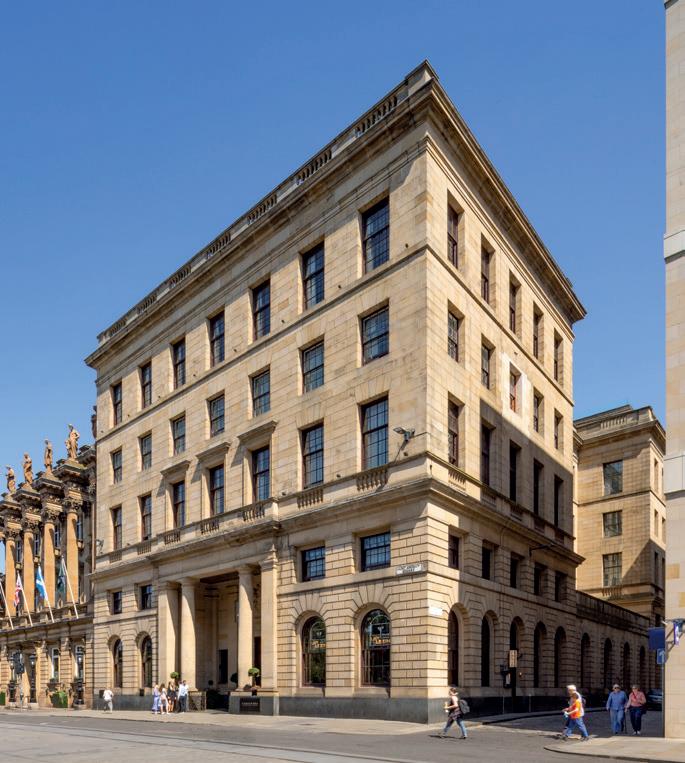
The latest arrival on Edinburgh’s hotel scene is The Hoxton, managed by the Ennismore group. It will open imminently at Haymarket.
The latest addition to the Hoxton portfolio, the Edinburgh hotel launch marks the group’s continued expansion across Europe and North America.
Set across 11 restored townhouses, the design-led hotel will open in June with 214 rooms, an all-day Italian trattoria called Patatino, a cinema, and a grand events ballroom.
Located on both sides of the street, the hotel is described as a “stitching together” of heritage Georgian buildings, with interiors designed by AIME Studios— Ennismore’s in-house team.
A spokesperson for the group said, “The hotel will feature 214 rooms including three self-contained homes (coming later in the summer), a spacious lobby offering cosy corners and vaulted ceilings in equal measure, an intimate cinema, a ballroom events space, The Apartment meeting and events concept, and all-day Italian restaurant.”
The new restaurant called Patatino will open at The Hoxton in July and will bring a modern Italian trattoria to Haymarket.
Patatino - which takes its name from an Italian term of endearment (literally ‘little potato’) - is inspired by the traditional trattorias and lemon grove-lined streets of Sorrento. Patatino aims to bring the energy of long meals with friends on the Amalfi coast to Scotland’s Capital.
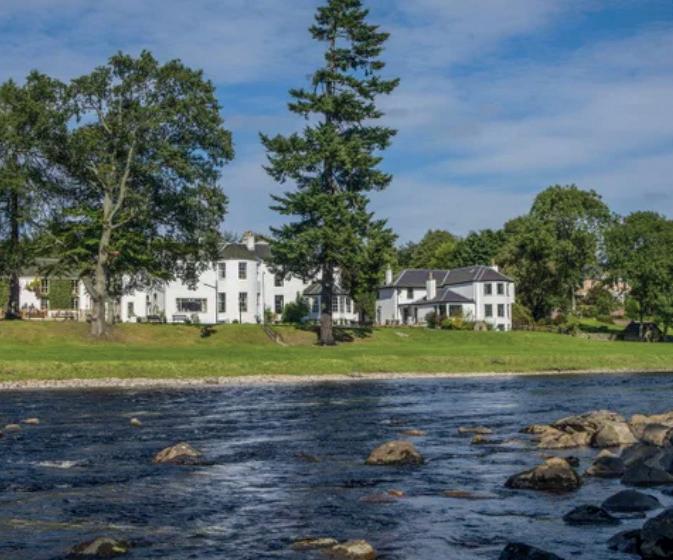
Banchory Lodge Hotel, a well-known riverside property in Aberdeenshire, is being sold with a a freehold asking price of £3.5 million.
Specialist property adviser Christie & Co is handling the sale of the 28-bedroom Georgian hotel, which occupies a seven-and-a-half-acre site on the southern edge of Banchory, overlooking the River Dee.
The hotel includes a private six-bedroom lodge with its own lounge, dining room and snug, catering to exclusive-use groups such as fishing, shooting and golf parties. The main building also houses a restaurant and bar, with an outdoor ‘sitooterie’ featuring a covered terrace, outdoor kitchen and cabins.
The business has built a reputation for quality local food and has become a popular choice for both leisure and corporate guests, as well as weddings and events. The property has been modernised over the years while retaining its period character and landscaped setting.
The Buccleuch Arms, a long-established coaching inn in the Borders village of St Boswells, is on the market with a guide price of £1.3 million.
The 19th-century property is being marketed by Christie & Co on behalf of owner Billy Hamilton, who has run the business for more than 20 years. Now planning to retire and focus on other ventures, Hamilton is offering the hotel for sale as a turnkey operation.
The inn features 19 en-suite bedrooms, a bar and bistro, large private garden, boardroom and function space. It occupies a prominent roadside position on the A68, just south of Melrose, attracting both local trade and visitors travelling for business or leisure.
Under Hamilton’s ownership, the Buccleuch Arms has built a reputation for local, seasonal food and a relaxed, country pub atmosphere winning the business multiple accolades, including four Scottish ‘Inn of the Year’ awards.
Gary Witham, Director – Hotels at Christie & Co, said: “This prominent hotel is at the heart of St Boswells and has not been available on the open market for over 40 years.The business offers a great mix of rooms and a stylish bar and restaurant, ready for a new owner to succeed on day one.”


The Harbour House Hotel and Anglesea Apartments in Portpatrick have been brought to market with an asking price of £775,000.
Marketed by Graham + Sibbald, the property occupies a prominent corner site overlooking Portpatrick’s harbour. The hotel includes eight letting bedrooms and operates with a food and beverage offering and the sale also includes three adjacent self-catering apartments, known as the Anglesea Apartments.
Portpatrick is a year-round tourism destination on the south-west coast of Scotland, and is part of the South-West Coastal 300 driving route as well as marking one end of the Southern Upland Way, making it a popular base for walkers.
According to the agent, the hotel and apartments benefit from consistent trade and present an opportunity to acquire an established business in a strong coastal location.
The Whitebridge Hotel, a characterful Victorian property occupying an elevated position on the tranquil south side of Loch Ness is a boutique hotel with 12 individually styled en-suite letting bedrooms, as well as spacious sixbedroom owner’s accommodation, is now on the market.
The property boasts a welcoming and well-established bar with an impressive food and beverage offering, an eclectic tea room, a cosy residents’ lounge, and a bright breakfasting room - all rich in period charm.
Lovingly restored and full of quirky character, the Whitebridge Hotel has built a strong reputation for quality and hospitality. The current owners are looking to retire and have put their hotel on the market through Graham + Sibbald for offers over £950,000.
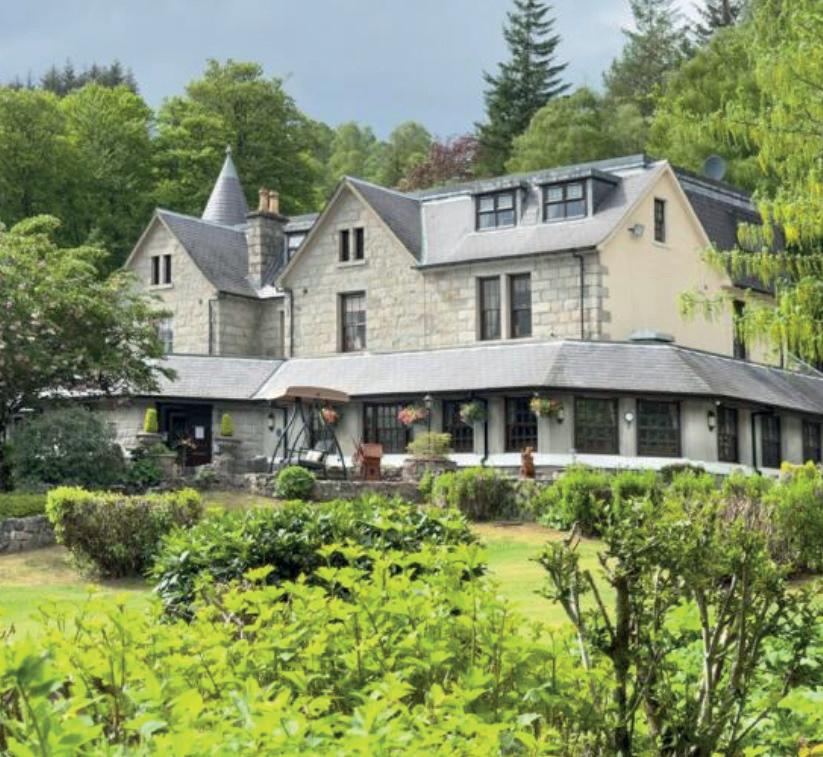
The Morangie Hotel and Mansfield Castle Hotel, Tain
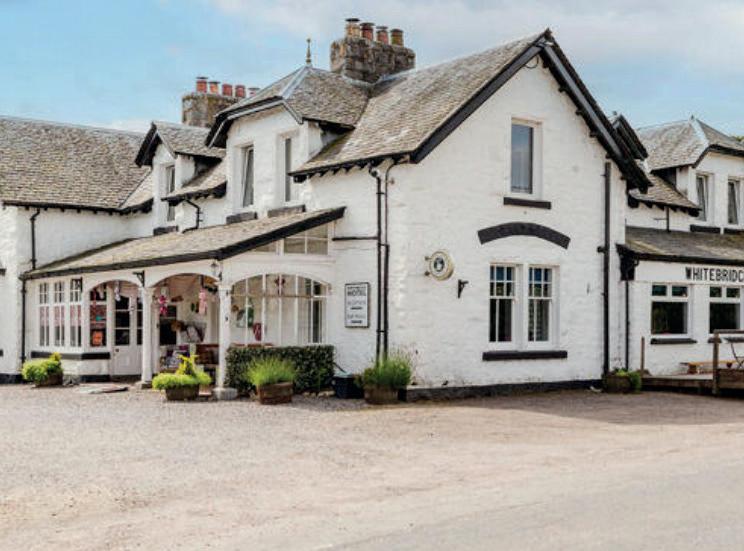
The 4-star Glenspean Lodge Hotel near Fort William - a beautifully restored Victorian country house dating back to 1880, can be acquired for £995,000 following the owners decision to retire.
The hotel, which was originally a hunting lodge for Laird Macintosh, has 17-bedrooms and enjoys panoramic views of the Nevis Range. It sits on 5 acres of private grounds along the A86, a key Highland tourist route. Trading on a seasonal basis, the hotel boasts luxurious guest facilities including a sauna, Jacuzzi, gym, games room, lounge bar, and the acclaimed Nevis View Restaurant.
Renowned for its period charm, lavish interiors, and strong repeat business, Glenspean Lodge is a true turnkey operation with clear potential for year-round expansion. Owners’ and staff accommodation, a modern biomass heating system, and recent fibre broadband connection add to the appeal. The seller is ASG Commercial, Inverness.
The Morangie Hotel and Mansfield Castle Hotel located along the iconic North Coast 500 route are two baronial-style properties being offered for sale as a package through Graham + Sibbald. The two have striking traditional architecture but also offer all the comforts of modern hospitality.
Together, they offer 45 letting bedrooms and are currently operated as a single, highly successful business. The hotels offer two inviting restaurants, elegant lounge bars, and versatile function rooms, making them ideal for events, weddings, and tourism-driven stays.
With a combined annual turnover of approximately £1.2 million and an impressive average adjusted profit of £278,000 over the past five years, the business boasts a solid foundation and strong online and local reputation. This sale presents a unique chance to own a true slice of Scottish heritage - a pair of castle-like hotels that blend tradition with profitability. They are looking for offers over £2.500,000.
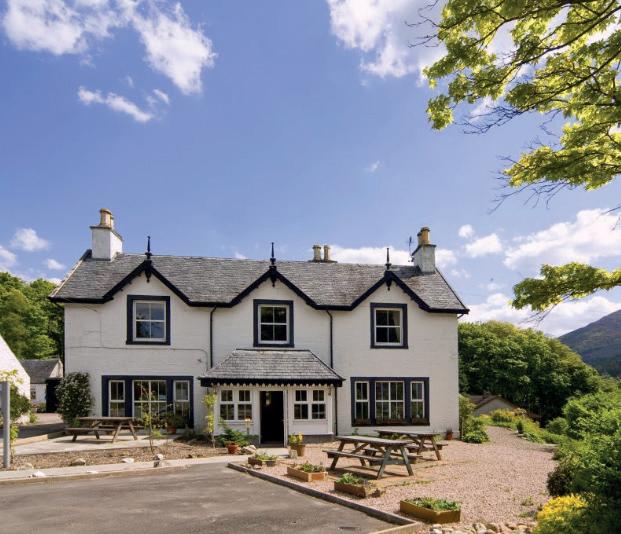
Loch Leven Hotel
Ballachulish
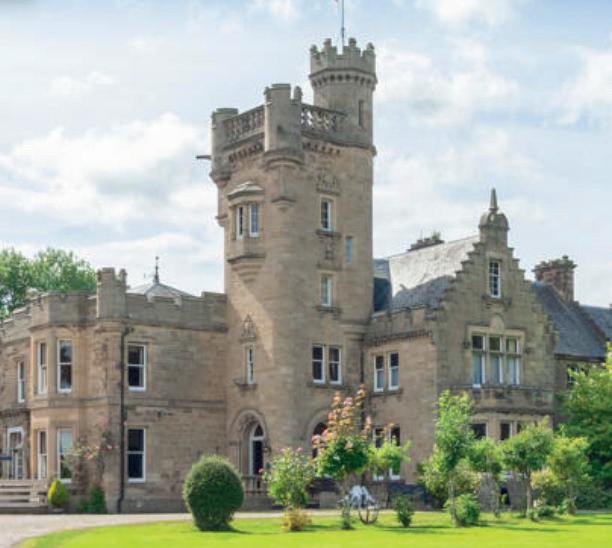
The Loch Leven Hotel in Ballachulish is an established and privately run business featuring 18 letting bedrooms, including a two-bedroom annex and four charming garden pods. Guests can enjoy the renowned Old Ferry Bar, the loch-view restaurant, a cosy Literature Lounge, and ample outdoor deck seating.
The sale also includes Caledon House, currently used as the owners’ accommodation and held under a separate title. A fully operational craft gin and rum distillery adjacent to the hotel is also part of the offering, adding a distinctive element to the business. Additionally, outbuildings presently used for a separate gin distillery venture may be available by separate negotiation.
This is an exceptional chance to acquire a thriving lifestyle business in one of Scotland’s most breathtaking regions, with strong branding, diverse income streams, and future growth potential. It is on the market through Drysdale and Co for an asking price of £1.450,000.
Scottish hoteliers urged to address digital drop-offs as mobile bookings surge and traveller expectations rise
Scotland’s independent hotels are known for their warmth, individuality, and local flair. From period buildings that tell a story, to menus that spotlight local produce and staff who know guests by name. But even with glowing reviews and repeat custom, many properties are losing business before guests ever step through the door. The issue? Underperforming websites.
While most hotels invest heavily in front-of-house presentation, back-office systems, and service delivery, fewer are matching that same standard in their digital shopfront. And in a mobile-first, alwaysconnected world, it’s becoming a costly oversight.
Recent research from Expedia Group has put hard figures to a longsuspected issue. 90% of travellers say a hotel’s “atmosphere and vibe” are key to their booking decisions. More notably, 67% are willing to pay a premium for properties that match that feeling. However, industry-wide booking conversion rates remain low, between 1–3% on average, while abandonment at the booking stage can climb to 90%.
For Scottish hoteliers, this represents not just a missed opportunity, but a potential leakage of loyal guests to third-party booking sites or better optimised competitors.
Guests today are digitally fluent. They move fluidly between devices, plan trips while commuting, browse options during lunch breaks, and complete bookings on the sofa with a smartphone in one hand and a TV remote in the other. Their standards are set by Amazon, Netflix and the seamlessness of social media.
A visually appealing site is no longer enough. It must also perform. That means fast load speeds, seamless booking engines, and responsive layouts that work smoothly across all devices.
Mobile traffic now accounts for more than 70% of all travel-related website visits, with 35% of bookings completed directly on smartphones. For Scottish properties looking to attract a younger demographic or international visitors, this shift is especially significant.
And speed is critical. A delay of just one second in page load time can increase bounce rates by 32%. If your site takes five seconds or more to load, which is common with older booking platforms, you can expect nine out of ten visitors to exit before even viewing a room. Improving load time by as little as 0.1 seconds can raise mobile conversion rates by 10%. That’s a meaningful lift in revenue for hotels managing tight margins and increased operational costs.
Guests don’t just abandon bookings for lack of interest. They also leave because of friction. That might be unclear pricing, long check-out forms, or uncertainty over cancellation policies. Yet data shows that many can be re-engaged successfully. Email recovery campaigns, those subtle, automated messages that follow up after an incomplete booking, see open rates of 44% and conversion rates of nearly 30%. Even better, the value of recovered bookings tends to be higher. Often guests return more confident and are likely to add extras like dinner reservations or spa treatments.
Hotels investing in recovery tools not only recapture revenue but also demonstrate attentiveness and professionalism. It’s an extension of good hospitality into the digital space.
While OTAs offer convenience, they lack the bespoke service many
travellers seek. Independent hotels can bridge this gap by offering more tailored digital experiences. Over 90% of travellers say they expect websites to adapt to them. That might mean showing different images, languages, or rates based on a user’s location. A visitor from France, for instance, might see French-language content and Euro pricing. A repeat guest from Aberdeen could be welcomed with recognition of their past stay and a relevant offer. Hotels that integrate personalisation into their web journeys report increased engagement, longer site visits, and improved conversion rates.
With 61% of guests checking OTAs before booking direct, your own website needs to instil trust quickly. That includes up-to-date reviews, clear cancellation policies, recognisable payment providers, and contact details that are easy to find. Google reviews and TripAdvisor scores still influence bookings heavily. Properties with fresh, strong review scores can see booking conversion increases of up to 20%, particularly important on mobile where users tend to make quicker decisions.
Smart upselling at the point of booking remains an underutilised tactic. Options like dinner upgrades, in-room treats, late check-outs, or local experience packages can add real value for guests while increasing revenue by an average of 18% per booking. The key is relevance. Offers must match the guest profile and not slow the checkout process.
Many hoteliers trust their booking engine because it integrates well with PMS systems or has been “good enough” for years. But not all engines are equal. Some convert at double the rate of others due to better design, faster performance, and stronger mobile compatibility. Choosing the right partner here can significantly affect your direct booking revenue and reduce reliance on commissionheavy OTA bookings. GuestCentric, a technology provider working with independent and boutique hotels, has found that applying usability principles to hotel websites can lead to conversion rates up to 400% higher, especially when supported by seamless design and targeted recovery tools.
A comprehensive audit of your digital performance should be the starting point. Check how your site performs on different devices, identify where users are dropping off, and assess whether your pricing is consistent with OTA listings. From there, focus on quick wins such as speed improvements, mobile-first design, and email recovery setups. Then consider more strategic investments in personalisation, integrated CRM tools, and marketing automation.
Ultimately, your website should reflect the same care and attention that guests experience in your lobby or guest rooms.
Scotland’s independent hoteliers already offer something OTAs and global chains cannot. Authentic, locally grounded hospitality. But that advantage only works if guests make it through the digital door first.
Remember, your website serves as your digital front door. Just as you wouldn’t allow your physical entrance to become outdated or unwelcoming, your online presence deserves the same careful attention and investment. Your guests’ journey begins long before they arrive at your property, and their first impression of your brand often forms during those crucial moments on your website. Make them count.. by Nicola Young

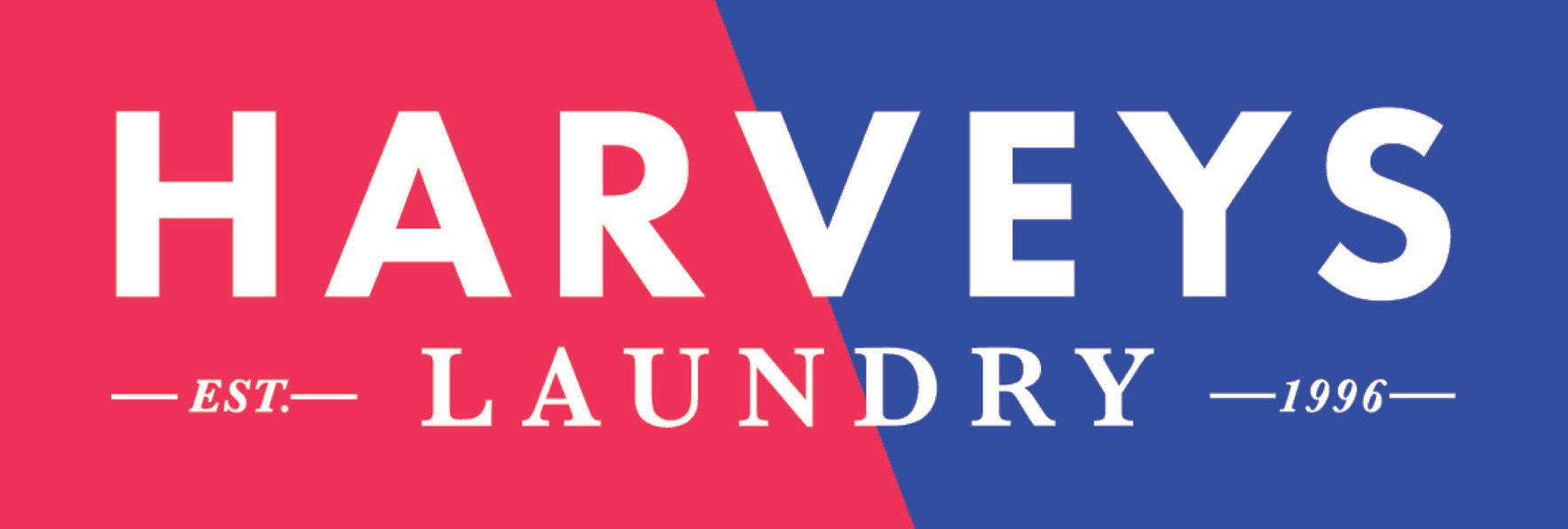
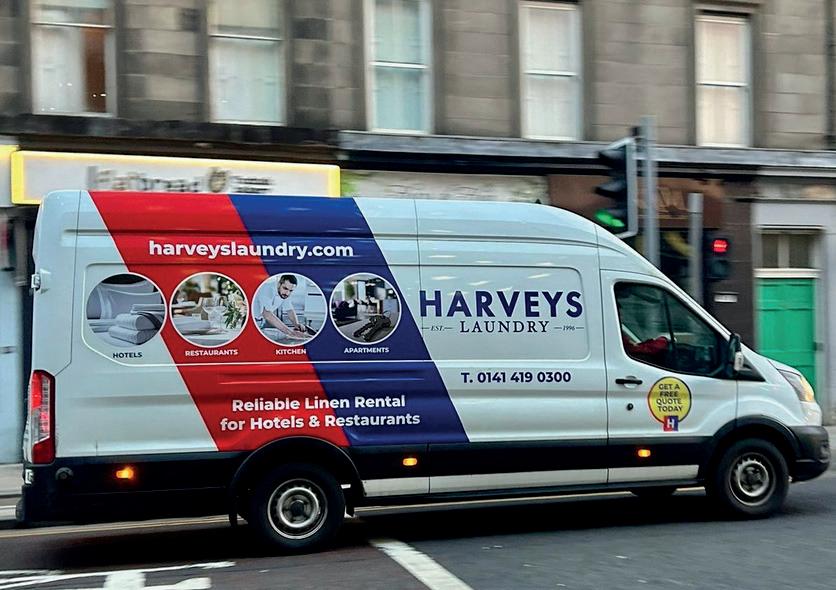
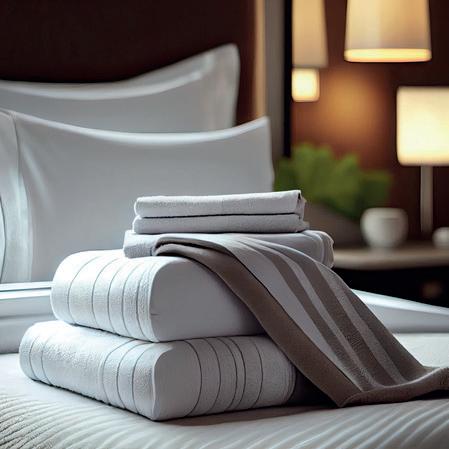
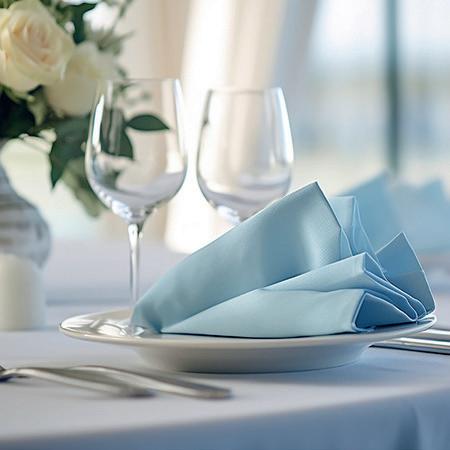
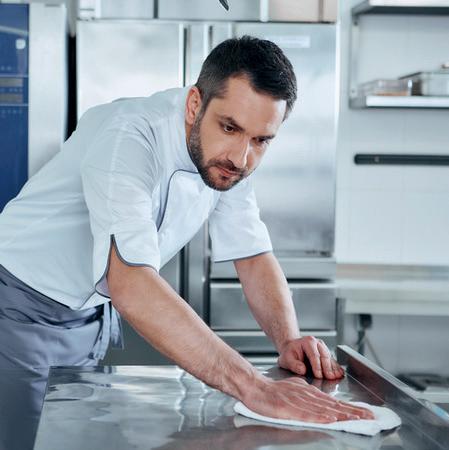




The 2025 HIT Scotland Industry Dinner took place on Thursday 13th June at the Hilton Glasgow, bringing together hospitality leaders from across the country for an evening celebrating excellence and future talent in the sector.
Two standout awards were presented on the night. The HIT Industry Award, went to Calum Ross, General Manager of Hilton Glasgow. Calum was recognised for a distinguished 40-year career leading hotels across the UK and Ireland under the Stakis, Jarvis, and Hilton brands. His leadership at Hilton Glasgow, combined with a longstanding commitment to excellence and mentorship, earned him high praise. He is also a long-time supporter of HIT Scotland, having played a key role in the 2011 Kilimanjaro expedition that raised over £150,000 for the organisation’s scholarship programme.
The Future Leader Award was presented to Glenn Woodage, Premium Business Manager at Whyte and Mackay. Selected for his professionalism, dedication, and impact early in his career, Glenn has made a strong impression through his work with the HIT Futures Group and his support for initiatives like the HIT the Hebrides Challenge and other fundraising efforts.
David Cochrane MBE, Chief Executive of HIT Scotland, said, “We were overwhelmed by the number and calibre of nominations received this year. Calum and Glenn stood out as truly deserving recipients. Both have demonstrated exceptional leadership, generosity of spirit, and a commitment to making a lasting difference in our sector.”

Ross

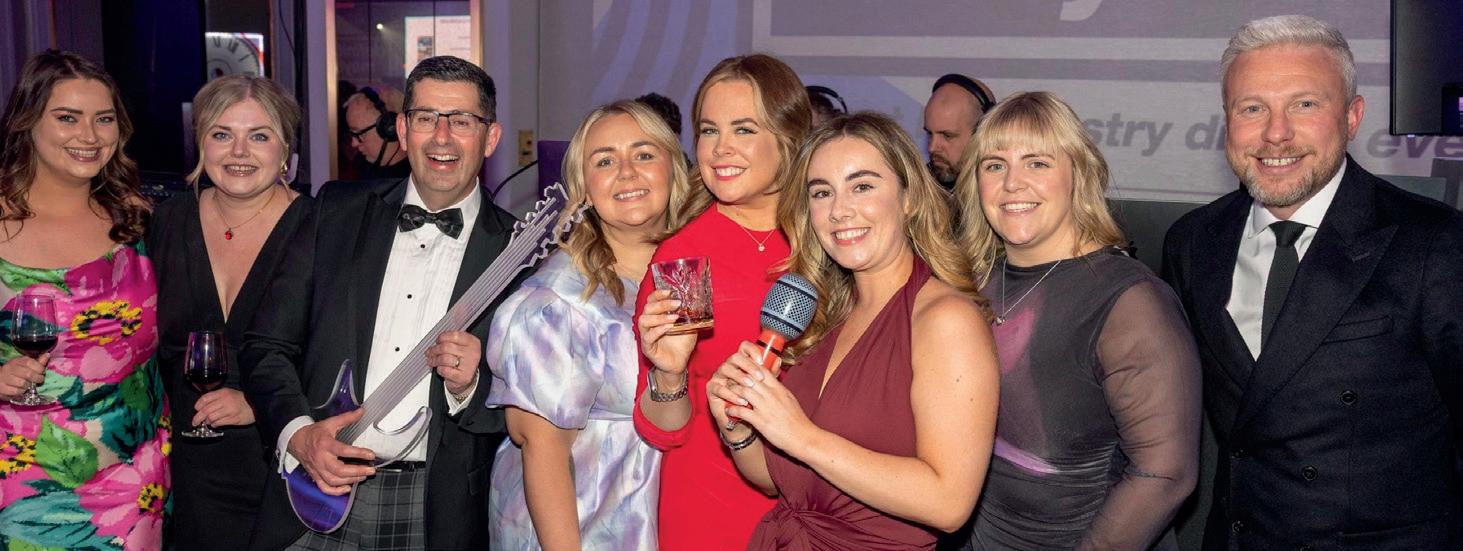
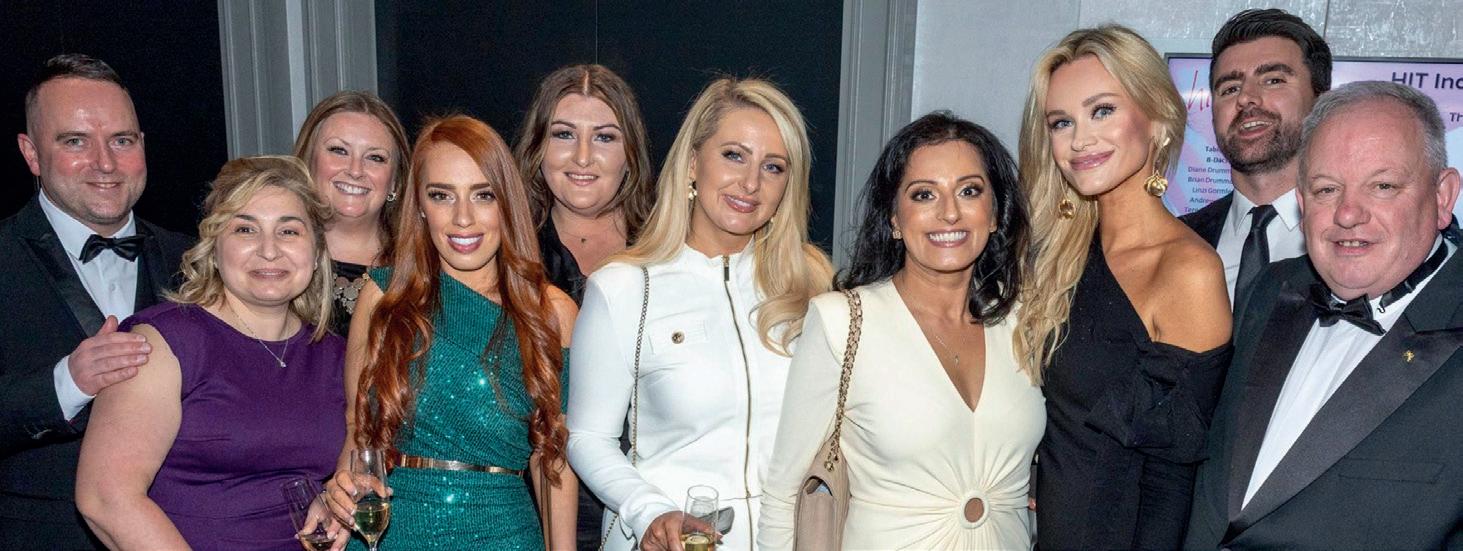



SUSAN YOUNG talks to Will Oakley, Managing Director of Cameron House, about his journey from the Caribbean to Scotland and the lessons learnt along the way.
On a gloriously bright afternoon at Cameron House, with Ben Lomond providing a stunning backdrop across Loch Lomond, I sat down with Will Oakley, the resort’s Managing Director, to find out more about the man tasked with creating a new strategic plan for the business and driving change - never an easy task.
Will took the helm of the lochside resort in January after a decade working in the Caribbean, although he did spend 2021 running Glenapp Castle, as he waited for international travel to resume. But most recently, he was Managing Director of a 300-acre private resort, Jumby Bay Island by the Oetker Collection in Antigua. Under his leadership, the hotel’s turnover and profit grew, which saw it awarded with a 5-star Forbes rating.
The move to Cameron House represents Will’s biggest transformation challenge yet. “Coming into this business, I recognise that there is history and legacy, loyalty and its reputation to consider. My role now is not just about the elevation of revenues and profitability; but perhaps more importantly elevating the product offering, service offering, reputation, and leading its local workforce to deliver really good consistent service.
“Here I have 700 people in the workforce of which 90% live within a few miles of the hotel. We are extremely lucky, but it is incredibly important message when running the business and looking to take strategic decisions, that there is a responsibility around sustainability of the local economy for the workforce.”
The resort also has 7,000 loyal members across five different membership categories.
Says Will, “They don’t necessarily all live in the immediate locale, and there is a need to work on improved communication and the membership relationship. We really need to bring that together, that is one of my objectives - and we will do this by communication, reward and recognition. There are hotels out there who work their entire lives working to try to bring up a community like we have got. So we are very lucky. These clients love being connected with the business and the brand, and they want to be well looked after and recognised.
“In Scotland it is all about relationships, in fact this is something Scotland has in common with the Caribbean. Whereas London has more of a performance culture.”
Will himself entered hospitality at the age of 18, although hospitality wasn’t initially his first choice. “I was actually looking to join the army, but Sir Hugh Wontner, who was Chairman of Savoy Hotels, wrote a book which I read in the school careers department. Hotels appealed to me because I never saw myself being stuck behind a desk. I wanted to be connected to people.”
At 18, he applied to the Savoy Group straight from school and joined its management trainee scheme. Will reminisces, “At the time, they had 300 applicants and took just eight. The Savoy was the best hotel you could train at in the world. It was the ultimate apprenticeship - you worked from the bottom up, got a degree in hotel management, and five years of hotel experience. In your fourth or fifth year, you got to choose anywhere in the world you wanted to work.
“At the end of five years I was a well-rounded hotel operator, but without any experience, what I mean is all I had was the groundwork, but I

hadn’t actually got any management experience.”
Will’s first role was with the Lanesborough, but by the age of 25, he got his first General Manager role with Firmdale Hotels. He smiles, “Like all 25-year-olds, I thought I was invincible. I made lots of mistakes, but you learn from your mistakes, and having the ability to ask for help always sat well with me, I never saw it as a weakness.”
Then he took a decision to continue his career not in big five-star hotels but in luxury boutique properties in London.
“I get the most enjoyment from ensuring everyone is happy and enjoying themselves. If something is not right, I want to make it right. I do realise that you can’t do that all the time, but that’s my mindset - we are in hospitality for a reason. I wanted more touch with guests and staff – and that was the attraction of the boutique properties.”
He went on to run a few more hotels, but in the early 2000s he moved out of hotels and invested in a restaurant business in London. They also set up food shops, before selling as the 2008 crash hit.
This led to Will joining the Bespoke Hotel Group, opening hotels and managing transformations. He explains, “I took a hotel a year out from opening to the finished product, and I also got involved in refurbishments. The Chairman of Bespoke Hotels said something to me when I joined, ‘Tell me when the adrenalin has worn off.’ I didn’t quite understand it at the time, but when the adrenalin wore off, I knew exactly what he meant and the next project loomed.
“When I started at Bespoke I didn’t know how long a project was going to take. By the time I went to Barbados in 2014, I knew from my experience there that it would not be an 18
month project. I knew it would take at least five years. In fact, it took seven.”
Will and his family moved to Barbados, and the project he was tasked with was to turn around Cobbler’s Cove. It had enjoyed a good reputation but had an ageing client base. It was a product which needed serious investment, and with a recent a change in ownership—the son had inherited it from his father, the opportunity was apparent.
“We decided not to close the hotel and make the changes over 18 months, but to manage the project in a staged way and try and take everyone on the journey. All of the staff were local, and we didn’t want to put them out of work for 18 months -when actually they were the backbone of the business. With the right mindset, and by ensuring buy-in from grassroots level i.e. the 90% who deliver the service within the workforce, we were able to turn the
business around.
“I was the only national, non-Barbadian to work there, and it was a privilege after I left to leave the hotels in the hands of its first ever female black General Manager. She is still there today and it is 100% locally run. It has been invested in, the product is great, the brand is great, the customer profile is younger, but the older customers enjoy it too. They co-habit in the same space.”
During the pandemic, Will and his family returned to the UK and to Scotland - to Glenapp Castle, which he joined in 2021. Says Will, “The intention had always been to return to the Caribbean, but we couldn’t until international travel resumed.
“My wife said when we got married, ‘I will go anywhere in the world with you but not Scotland...’ and of course we ended up in Ayrshire,” he chuckles. “She had never been north of the Watford Gap. Now she loves it.
“However, we found the remoteness of Glenapp quite tough, but we could also see the positives. Ayr was an hour away and going to Ikea was a day out, but we loved the local community and the village pub. It had bags of character and charm. We found it a very friendly environment.”
When international travel resumed, Will and the family headed back to the Caribbean and a 300-acre private island in Antigua with 52 private homes and a resort. They stayed there for two years; however, before long Will found himself yearning for something different. “It was a different world- it wasn’t my world and my family’s world. We lived on the island, but we didn’t have a community - we also wanted our youngest to have an uplift in her education. In the Caribbean they actively teach the children to work slowly to conserve energy, because of the humidity and the heat, that’s why there is a lovely Mañana, mañana culture.”
Today, his family live in Northamptonshire and Will lives in Scotland during the week. He tells me, “This is working better for us than living on a small island. No one respected my time off there so it was seven days a week, 24 hours a day. Here I can go to Northampton and focus on the family, but when I am here at the hotel I work long hours. I can almost achieve two weeks’ work in one week. I also don’t have to worry about the family dynamic when I am here. That doesn’t mean to say I don’t think about them and speak to them, but the point is I can be a bit selfish and focus on the family that is here.”
That is just what he is doing. He says, “I’ve been improving communications and making sure everyone is coming on the same journey. I try and do a video update every month with the staff—because I don’t get to see every single one of the team every month. This ensures they hear and see from me and get an update on progress. I also have to find the right times to
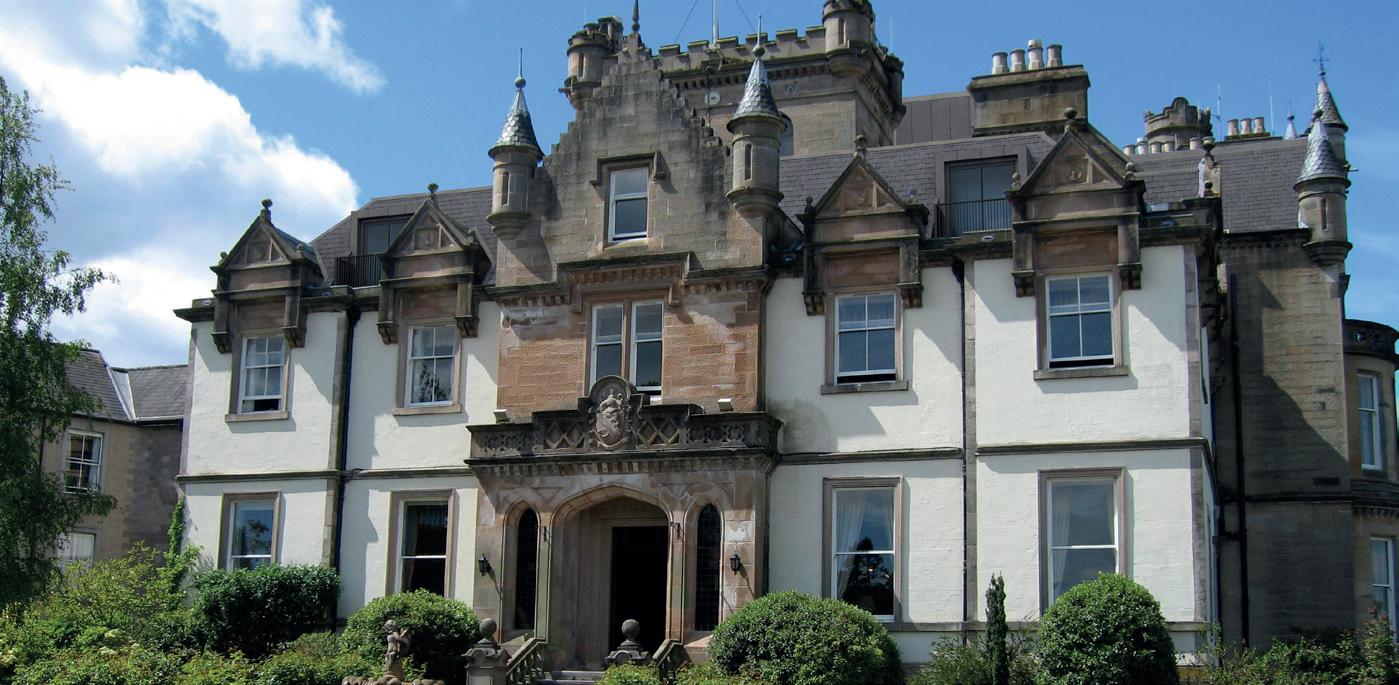
pop up and be around, talk to the team, and I go and have lunch with them in the canteen. These are all important moments for me to connect and I recognise in the early days and weeks people felt a bit uncomfortable at times ‘Oh no Will is coming to sit next to me...’ but actually once they realise I am human and I care about them as an individual they relax.
“Realistically I think this will be a three to fouryear project. That doesn’t mean I will exit then, but I think it will take that time to complete the transformation. You have to bring a bigger workforce and a bigger executive team with you. If there is any areas of dysfunctionality, you have to work through it and break down any barriers.”
He continues, “We are executing a new programme aimed at ensuring our team retains the warmth, flair, and distinctly local personality that defines true Scottish hospitality. That said, we also want to provide some clear prompts so that no matter who’s serving a guest, the experience feels consistent. We want to ensure that this journey we are on is one that both the customers and team buy into and enjoy and that the change is very visible.
“While we’ll always listen to feedback, there’s absolutely no place for abusive behaviour from guests. I will not tolerate that. It puts off our younger team members, many of whom are just starting out - and that’s one of the reasons people leave this industry too soon. We need to create a safe and respectful working environment.
Cameron House is a place where people from all walks of life gather - you’ll find hardworking grafters dining alongside landed gentry. Everyone is welcome here, so long as they respect the space and the people around them. That’s what makes us unique. But if someone feels out of place in that atmosphere - perhaps this just isn’t the right venue for them. We can’t be everything to everyone, but what we can be is a warm, welcoming place for those who align with our values.
Perception is everything in this industry. Our top priority is delivering value for money - guests should leave feeling that every penny spent was worth it. We’re not overpriced, but we do recognise that to elevate the guest experience, our attention to detail has to be sharper. That’s where we’ll stand apart.
Running a business today is not easy -
whether it’s political instability, rising operational costs, or pressures on the cost of living. You often see early signs of recession in property and hospitality - and right now, the signs are there. But I believe that Cameron House has a strong place in this market. We provide an escape, a break from the everyday. If someone is going to spend money, we want them to feel like coming here was worth it. That’s the bar we need to reach.
“One of my personal missions is to tackle the seasonality challenge. Having spent the last decade working in seasonal businesses, and have been part of breaking that cycle, I don’t have the tricks up my sleeve to deliver it overnight, but over the next three years I think we will be able to demonstrate there is year-round business here at Cameron House.
“I think with the right strategic direction that this can be an iconic year-round business, delivering in many different guises. Leisure at the weekend and a mixture of leisure, groups and corporate during the week. We have the golf, the marina, the spa, and the lodges. The majority are timeshare ownership, but there are multiple weeks available for rental. Why not in the depths of winter come and bring your laptop and stay here and look at Ben Lomond? Do your work from here?
I will know whether we are succeeding because success will start to be measured on the feedback guests give. That is our number one benchmark. Are we consistent, are we getting it right, are we looking at the detail of what the guests are telling us? What do they want, and what do we have to deliver on and if we can start to deliver on those and show we are listening, people will start to come on that journey.
“I think the word’s ‘five-star’ and ‘luxury’ get over-used. In my short tenureship here to date, I’ve noticed our biggest and loyalist audience are the Scots, followed by the domestic market, and we need to be much more consistent in what we do as a big business.
“We need to use the information that is available to us to get fitter and better. We want Cameron House to stand out as Cameron House. There are iconic hotels in Scotland and across the UK, and we want to have our own identity. We don’t want to be compared to any other hotel.
“We want to be known simply as Cameron House.”
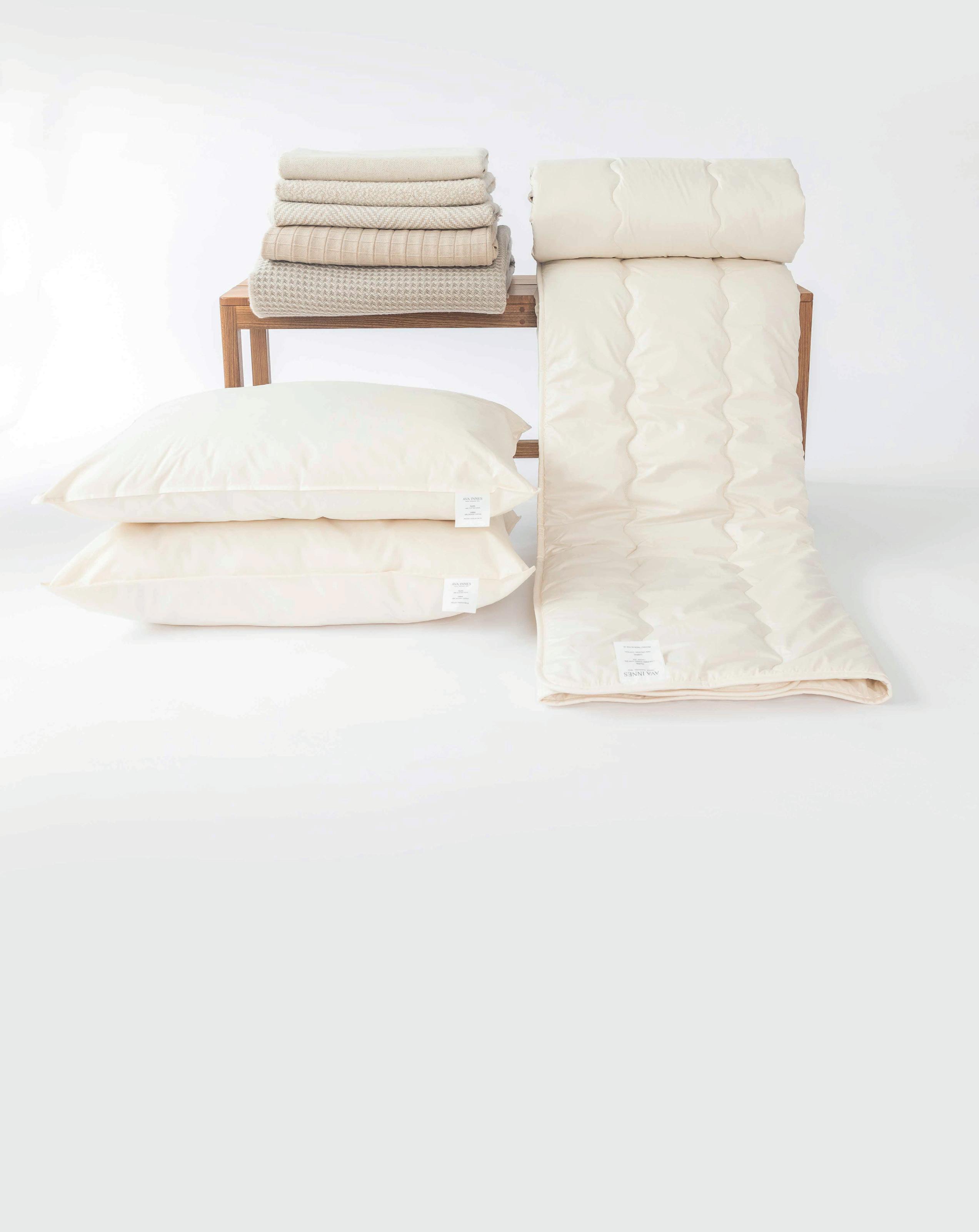




Proud luxury linen suppliers to the new Gleddoch Spa




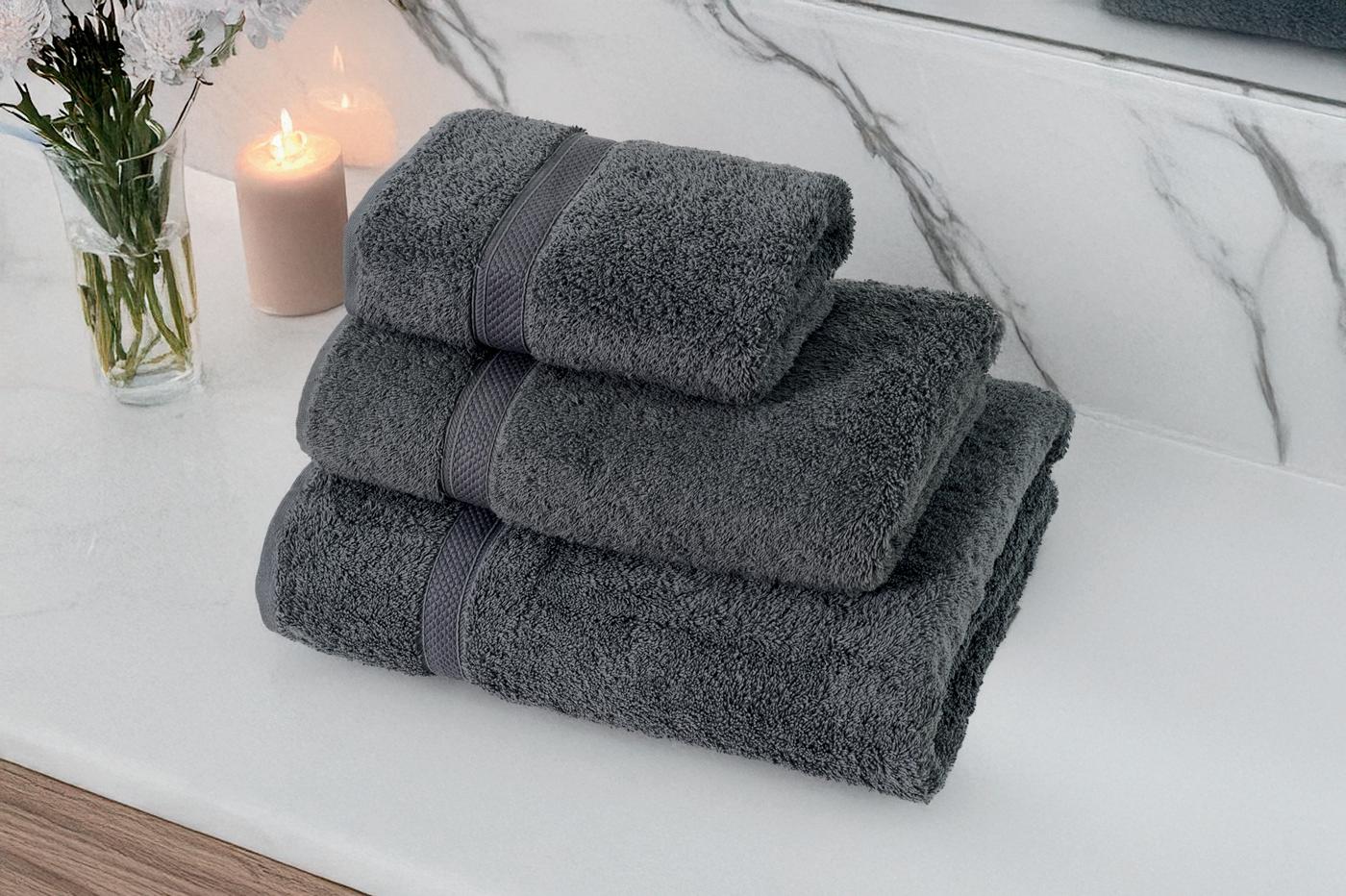

From five-star retreats to heritage estates, BC SoftWear is the textile partner of choice
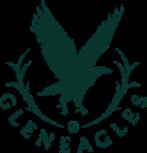



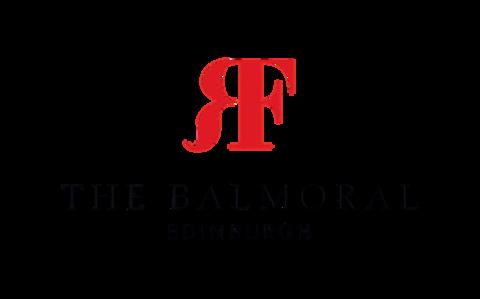







Gleddoch Golf & Spa Resort has officially reopened its fully renovated Imperia Spa following a multimillion-pound refurbishment. Originally opened in 2017, the spa sits on the historic 350-acre estate near Glasgow, once owned by shipbuilding magnate Baron Lithgow.
The redesign, led by 3Design Scotland, introduces several new features including seven treatment rooms, a 45-square-metre outdoor sauna - now the largest in the UK - with panoramic countryside views over over to Ben Lomond and a Himalayan salt sauna located in the expanded spa conservatory. A new wellbeing studio, spa restaurant, and a bar area have also been added.
James Anderson, General Manager at Gleddoch, said, “The opening of the Imperia Spa marks the culmination of a vision to create a destination that defines its own standard of luxury. Every moment and detail has been considered to transport guests to another world.”
Inspired by the estate’s maritime heritage, the updated interiors reflect the golden age of travel with design elements like black marble, antique gold, crystal accents, and quilted textures.
The spa offers a wide range of thermal and relaxation experiences. Alongside the landmark outdoor sauna with views extending to Ben Lomond, guests can enjoy the aroma and salt steam rooms, Himalayan salt sauna, and heated loungers overlooking the surrounding landscape.
At the centre of the spa is a striking indoor pool finished in antique

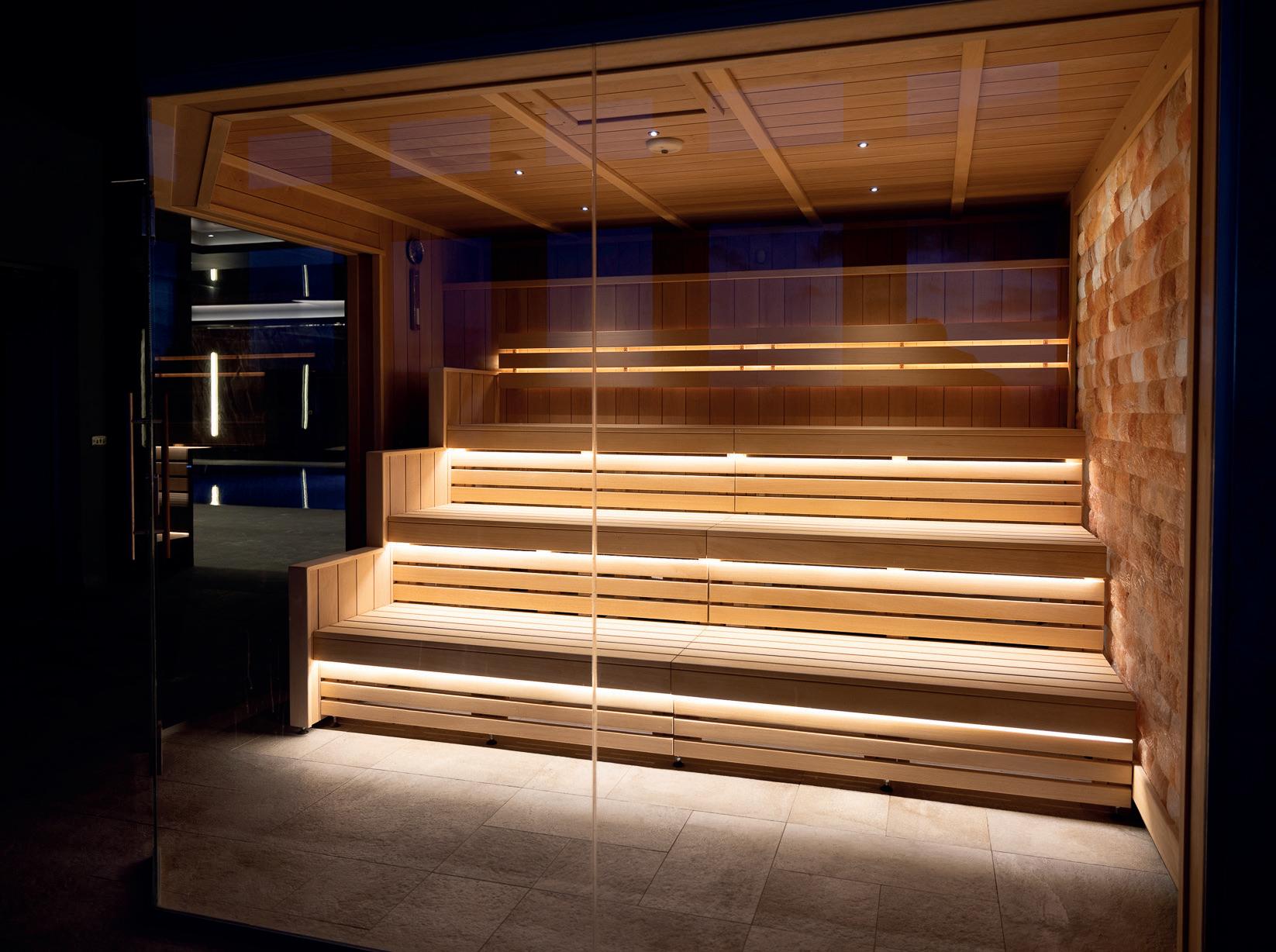


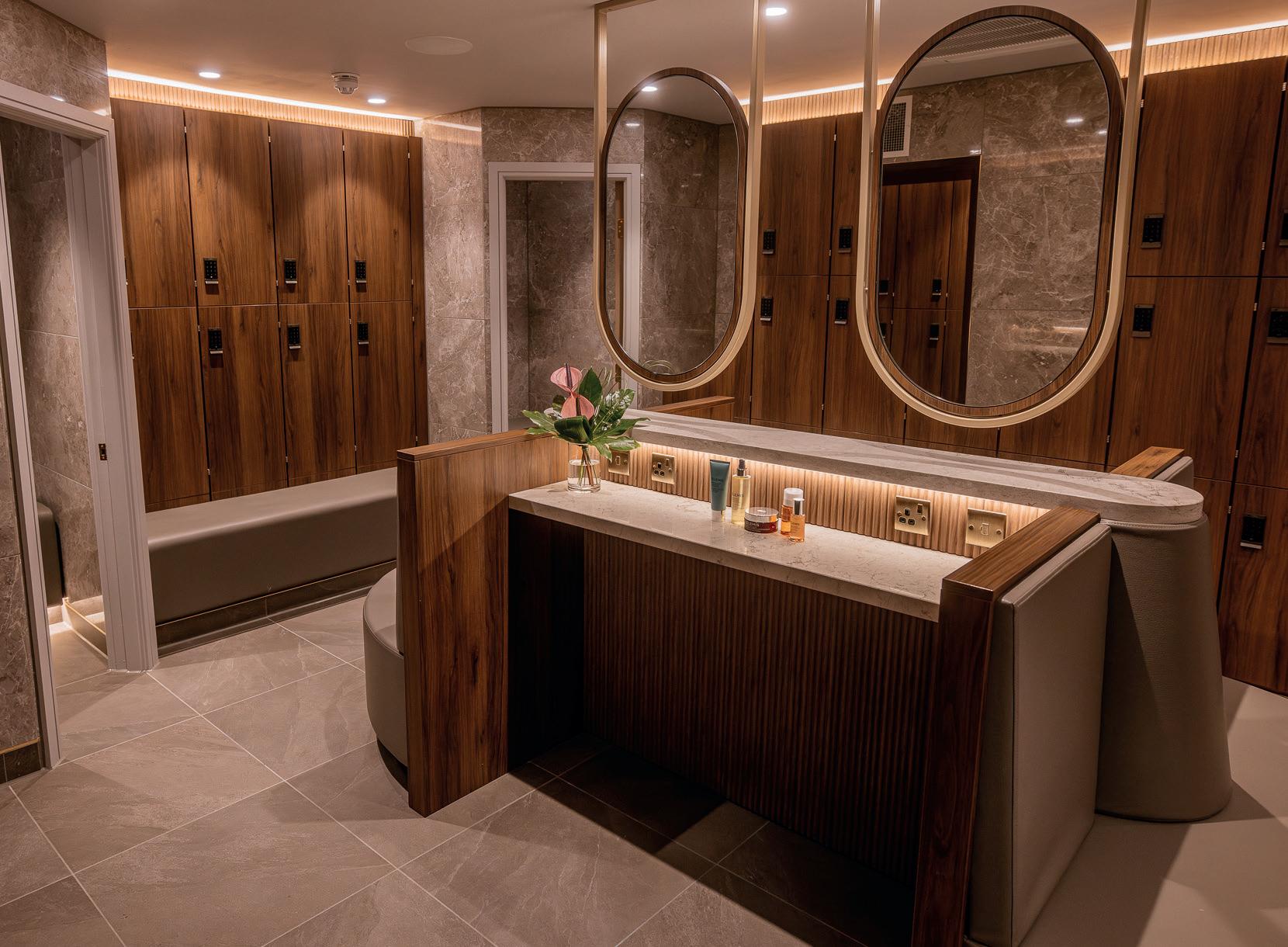
gold and black tones. Additional facilities include an outdoor hydrotherapy pool, ice fountain, sensory showers, and a cold plunge pool for contrast therapy.
The new gym features state-of-the-art Technogym equipment, a Peloton bike, and a free weights zone. A variety of instructor-led classes—ranging from yoga and Pilates to strength and conditioning—are offered in the Wellbeing Studio.
Imperia also includes seven treatment rooms and quiet areas for relaxation before and after therapies. Treatments are offered using brands such as Natura Bissé, Elemis, Temple Spa, and Tri-Dosha and all its luxury spa robes are supplied by BC Softwear.
Richard Johal, Director at Gleddoch, “We’re delighted to partner with BC SoftWear for all our spa robes and towelling. The quality of the products is exceptional and complements the luxury experience we strive to deliver at Gleddoch. The team have been a pleasure to deal with –always prompt, helpful, and professional. Their customer service is truly first-class.’
General Manager, James Anderson added, “Every detail of Imperia has been designed to surprise and delight, creating an escape unlike anything else in Scotland. This is not just a spa; it’s an experience where indulgence, heritage, and contemporary wellness meet.”
Gleddoch Golf & Spa Resort includes 76 bedrooms, an 18-hole championship golf course, and a 16-bay driving range. Operating as a hotel since 1974, it has hosted notable guests including the late Queen Elizabeth II and the Real Madrid football team. The property was acquired by the Johal family in 2015 and relaunched under its current name in 2017. It is now part of Best Western’s WorldHotels luxury collection.





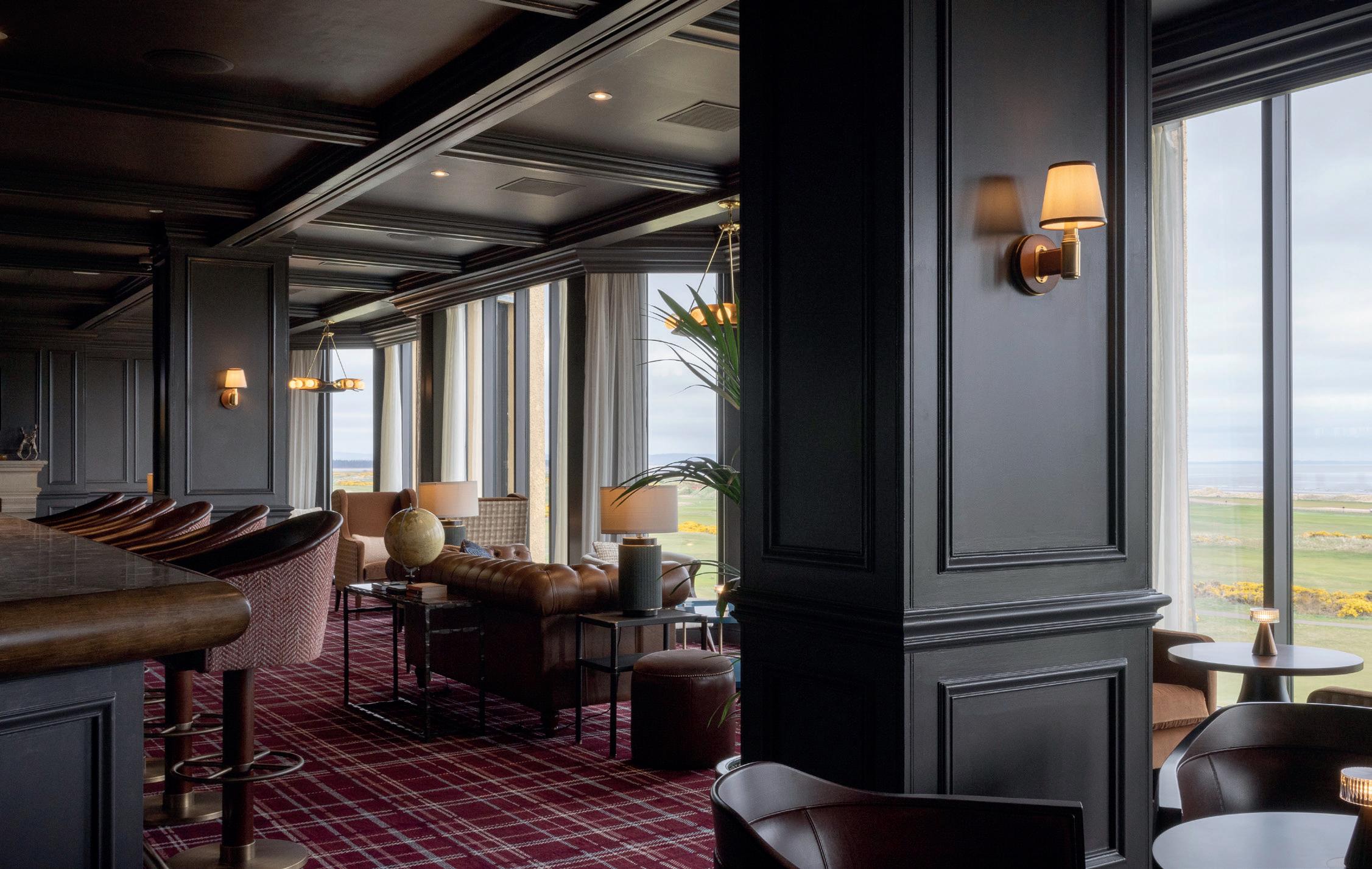
With a legacy of 157 years in delivering excellence, Thomas Johnstone Ltd are proud to have been the main contractor for the refurbishment of the Old Course Hotel’s iconic fourth floor.
The project was brought to life by our Specialist fit-out team, whose skills were complemented by the expertise of our in-house Decorating and Manufactured Joinery divisions.
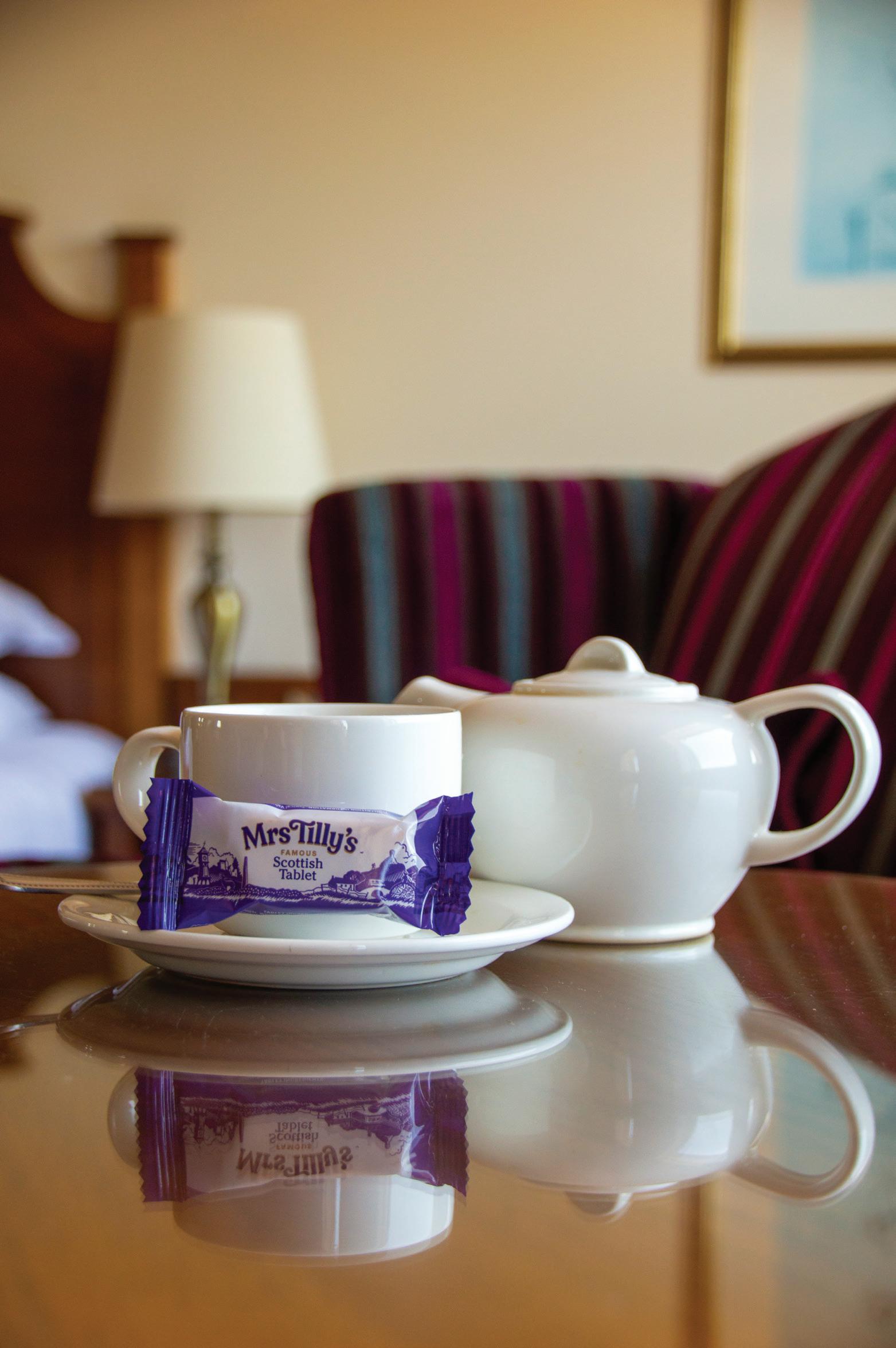
Highlights included French polishing of heritage pieces, bespoke paintwork, wallpaper installation, and the restoration of key architectural features, all completed to our unwavering standard of excellence.
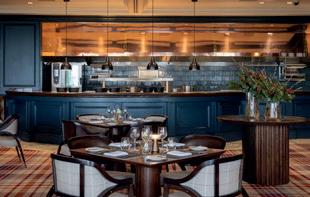
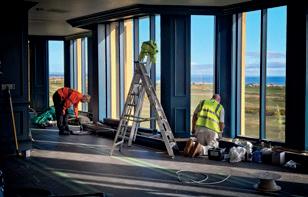
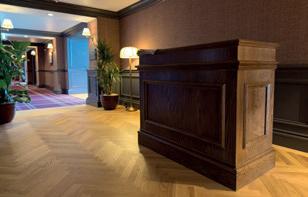
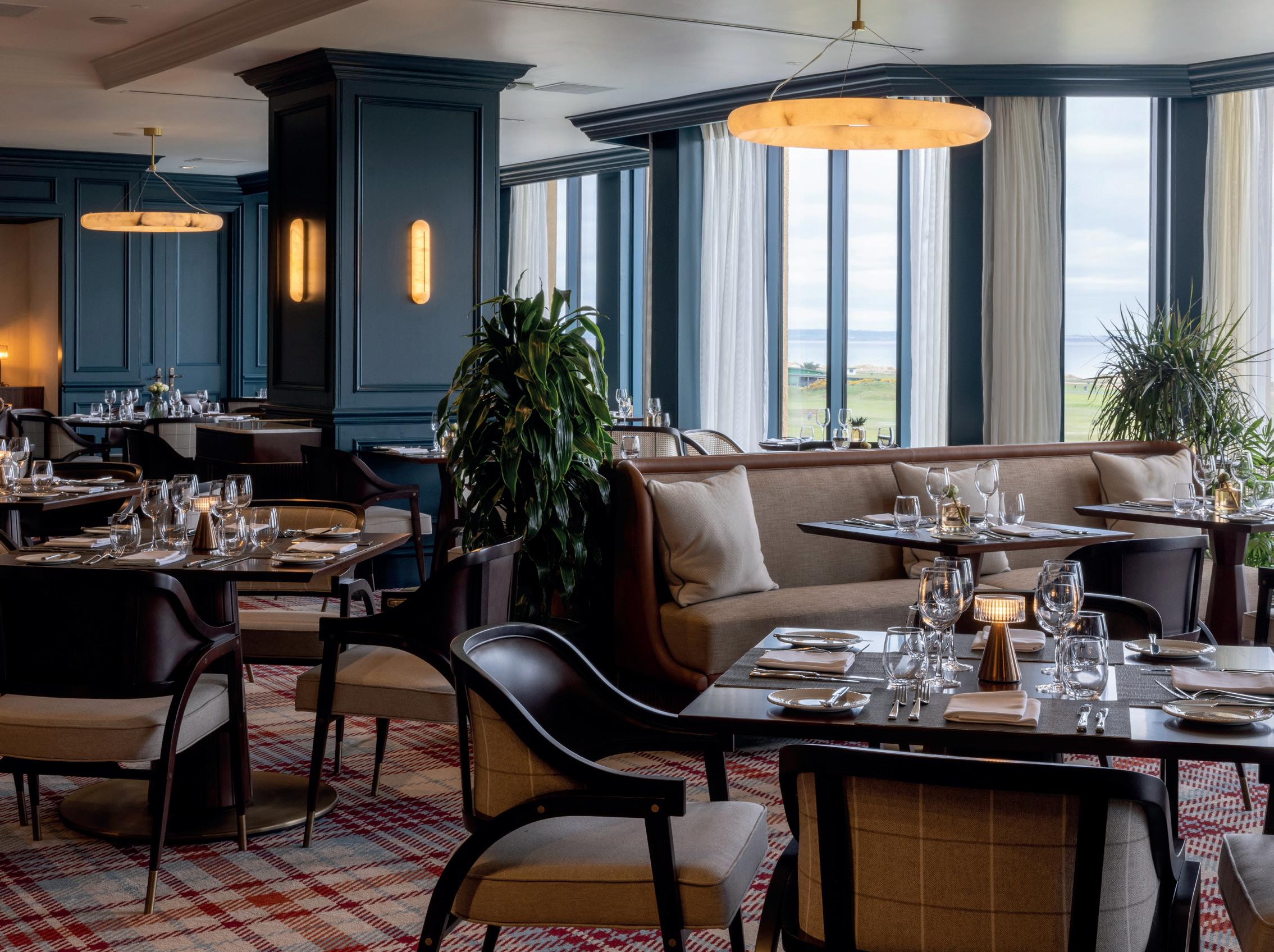
BY SUSAN YOUNG
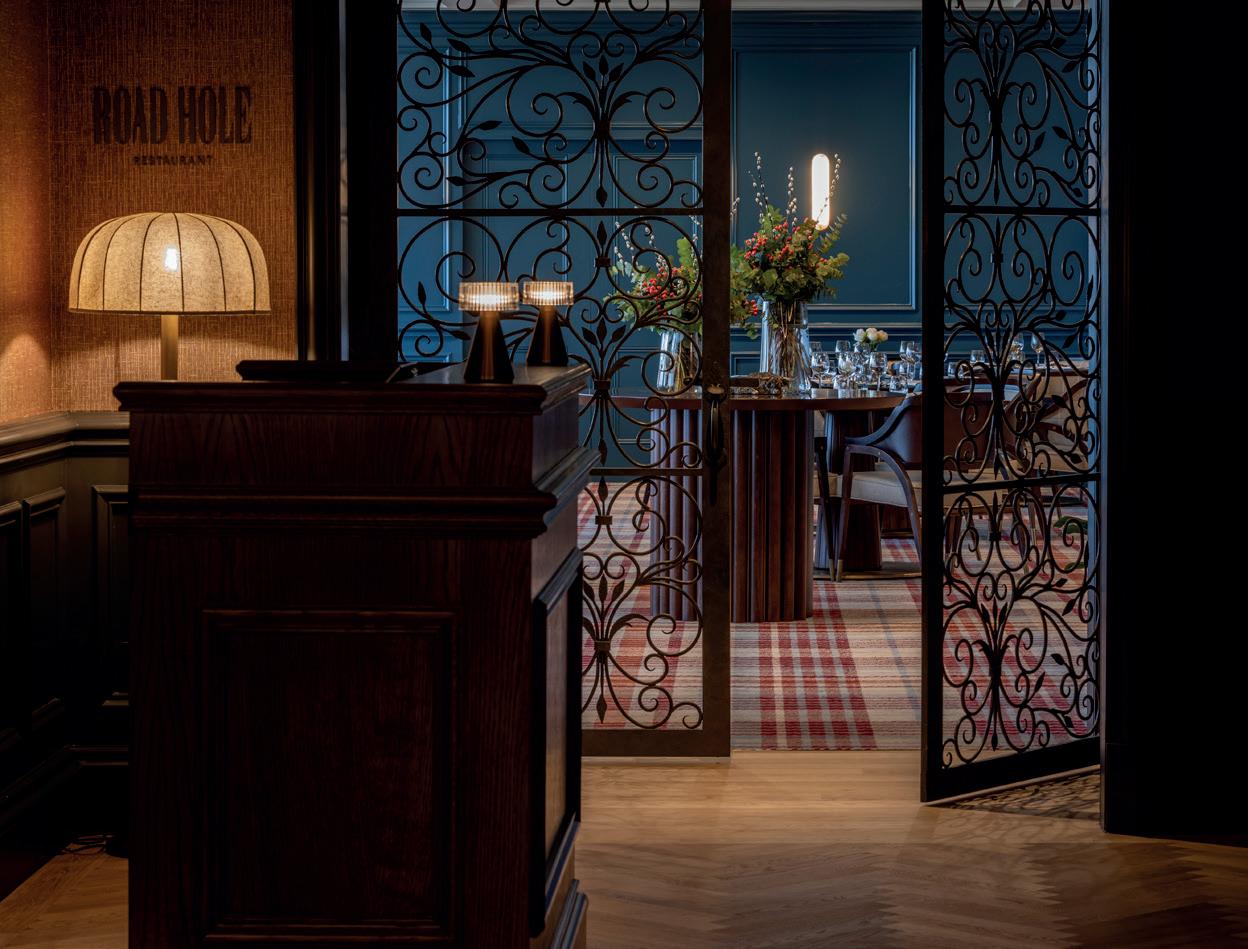
The Old Course Hotel, Golf Resort & Spa now boasts a newly refreshed fourth floor. Perched above one of golf’s most iconic landscapes, the space has undergone a complete renovation over the last few months.
A stylish redesign has transformed the iconic Road Hole Restaurant to offer relaxed fine dining, while chic, comfortable interiors bring new life to the Road Hole Bar.
This renovation, led by design firm Richmond International, has been a work of passion for the Old Course Hotel, a hotel that takes pride in its traditional Scottish hospitality and heritage.
Phyllis Wilkie, General Manager at Old Course Hotel said, “This renovation embodies our ethos of always evolving while remaining true to our roots. Our guests can savour both the landscape and cuisine that makes Scotland truly special and revel in the elevated, comfortable spaces that nod to our home in St Andrews, and give a true sense

of place.”
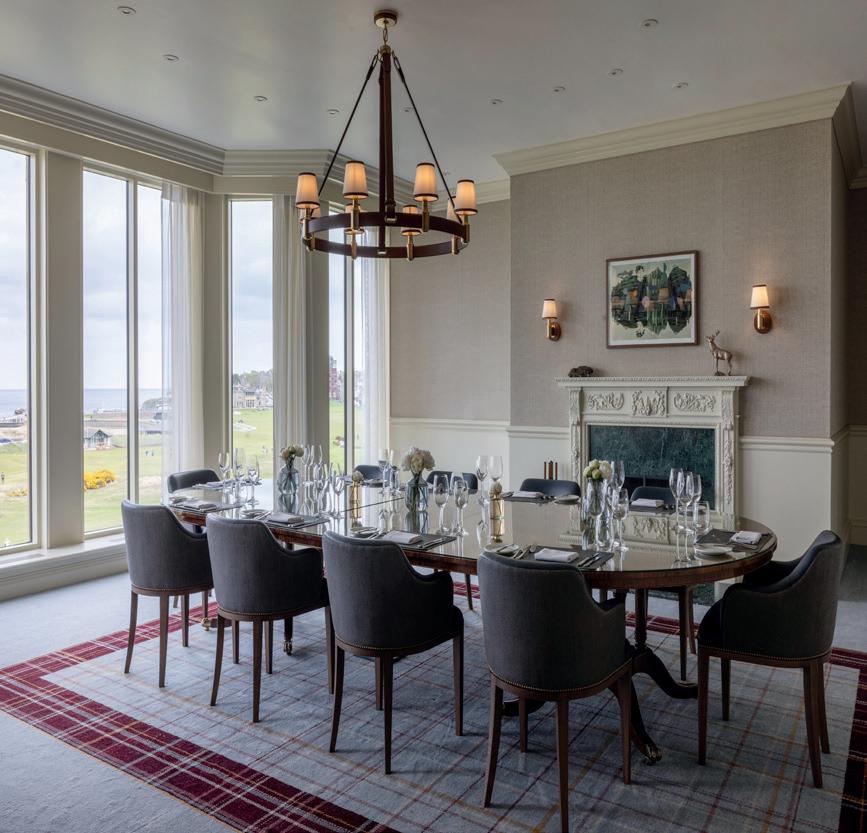
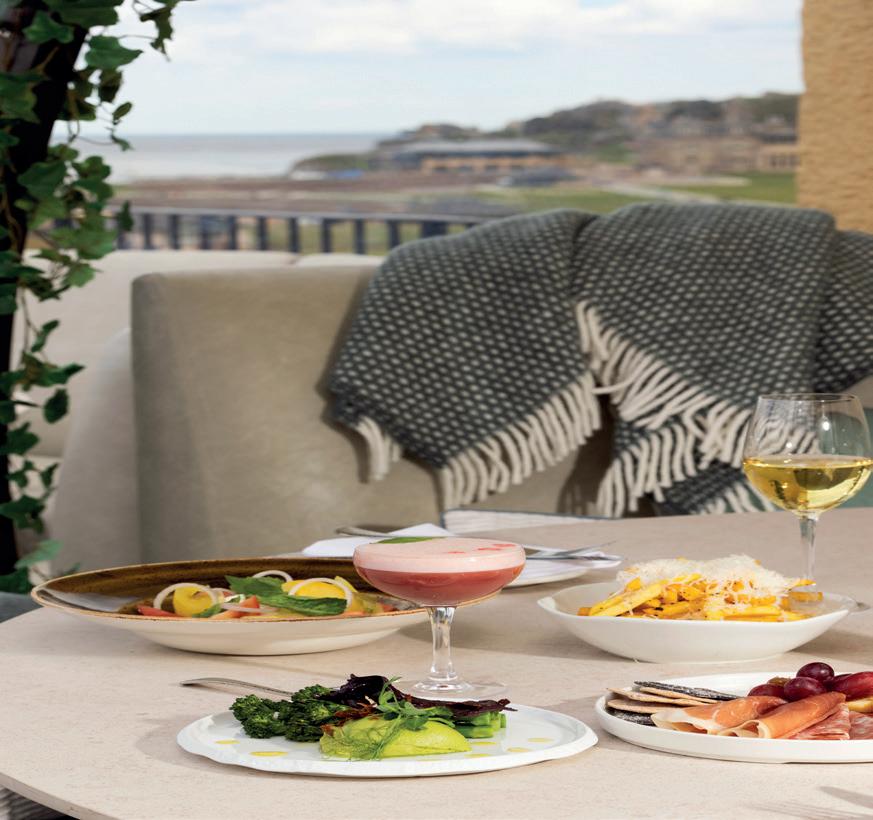
“We’re not just renovating a space,” adds Wilkie, “we’re creating living narratives that connect our guests to the soul of Scottish heritage while delivering truly indulgent good times.”
The refurbishment brings together some of Scotland’s most prestigious manufacturers. Johnstons of Elgin, established in 1797, provides luxurious fabrics for banquettes, dining chairs, and cushions, with designs inspired by the local landscape.
The custom contemporary tartan carpet, commissioned in honour of the late Herb Kohler Jr – who purchased the hotel in 2004, and always had a desire for tartan to be included in the interiors – was crafted by family-owned Ulster Carpets, the same company selected to create carpets for the King’s Coronation.
The Boardroom has seen a complete interior design refresh. The space features a beautiful cream woven wallpaper creating a soothing atmosphere, complemented by artwork depicting dreamlike Scottish landscapes and reimagined floral forms chosen to foster a connection between guests and their surroundings.
Boasting what may be one of the most
spectacular views from any boardroom in Scotland, this versatile space serves both corporate meetings and private dining experiences, where guests can enjoy exceptional cuisine while taking in the breathtaking panorama.
At the heart of the new Boardroom sits the original boardroom table, expertly reconditioned by Ayrshire-based Thomas Johnstone Ltd - a company founded in 1868 that has restored several original features on the fourth floor.
The renovation further celebrates heritage craftsmanship, with Thomas Johnstone Ltd also breathing new life into the much-cherished piano, which had seen some sun damage over the years sitting beside the floor-to-ceiling windows.
Joint Managing Director, David Haddow, of Thomas Johnstone said, , “Delivering excellence is at the heart of everything we do at Thomas Johnstone Ltd. The fourth-floor refurbishment project at the Old Course Hotel demonstrates the value of our integrated approach, with our Specialist Fit-Out, Manufactured Joinery, and Decorating teams working seamlessly together - and in close collaboration with the wider project team and client to ensure smooth delivery and the highest standards throughout.”
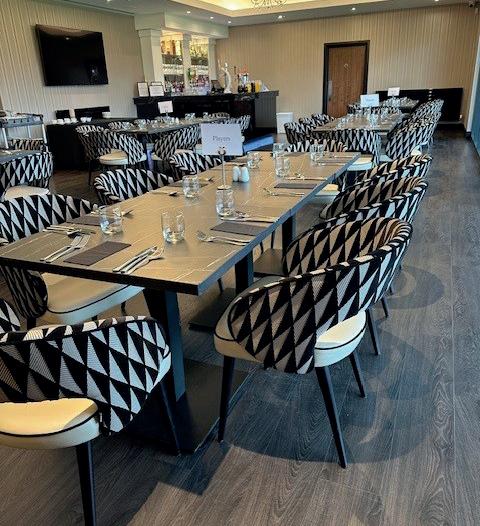
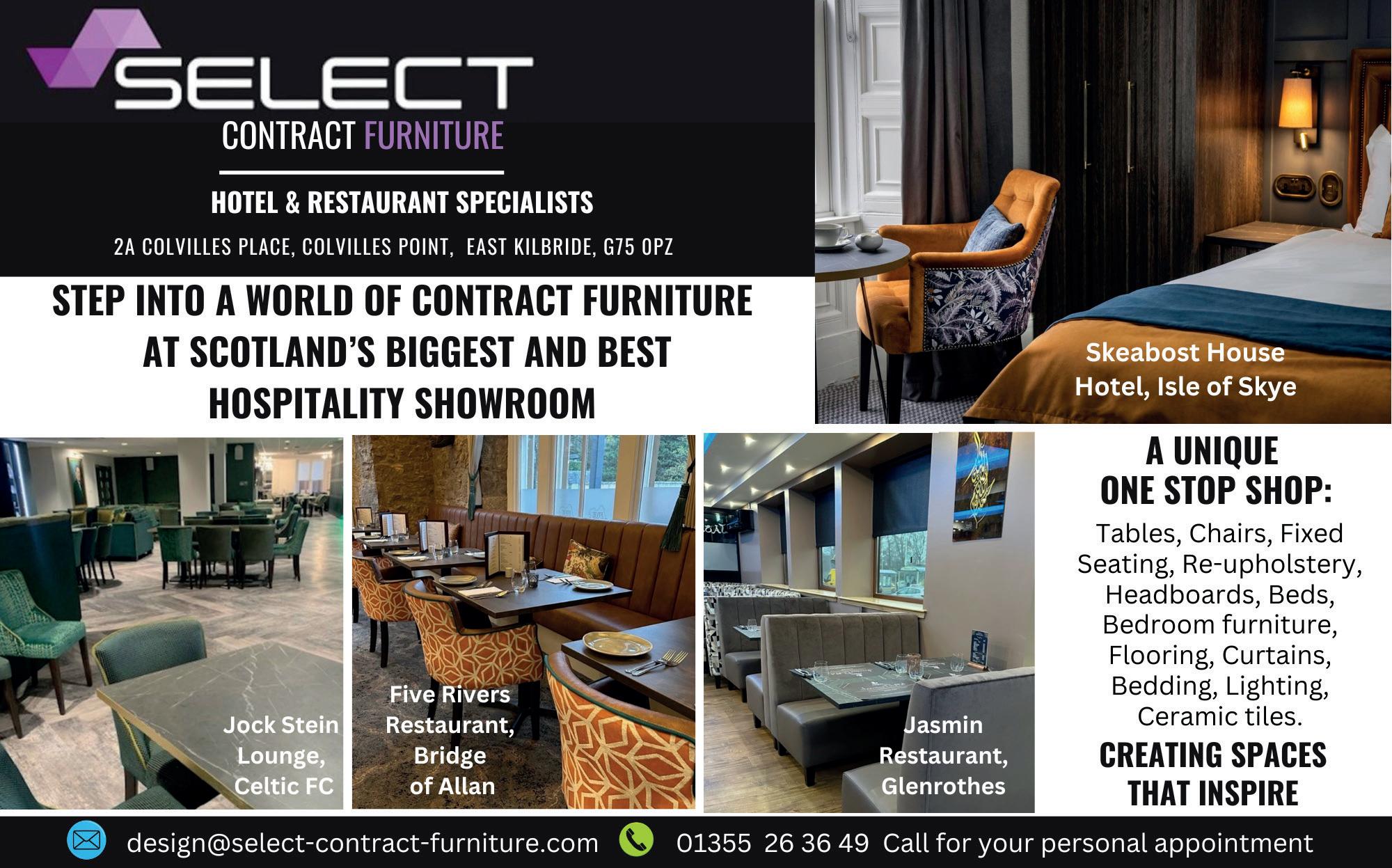




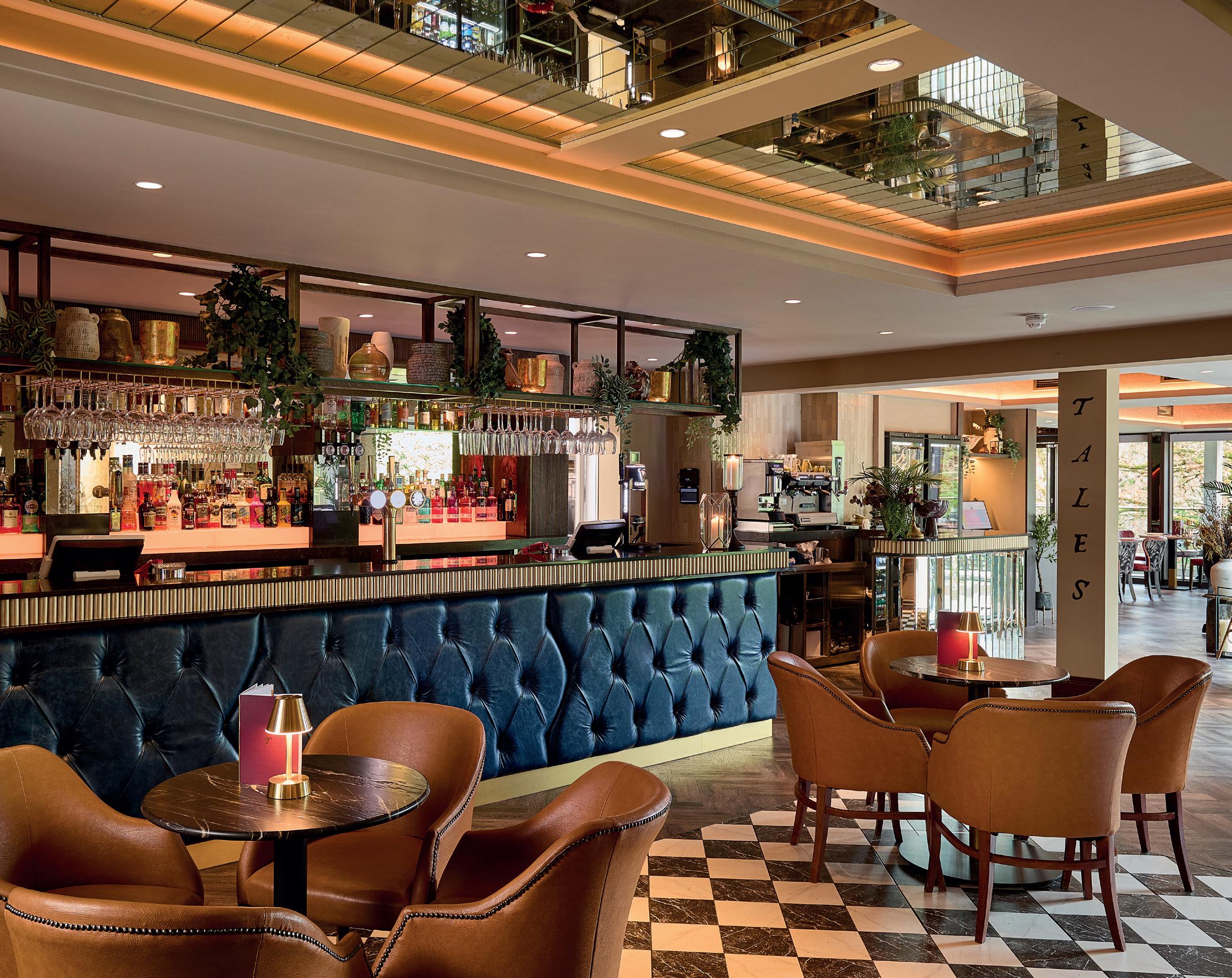
Delighted to supply Tales at Brig o’Doon House Hotel. Wishing the team every success.
Glass Age Ltd
8 Dunvegan Place Uddingston Glasgow G71 7TR
Tel: 0141 772 4114 enquiries@glass-age.co.uk www.glass-metal.co.uk
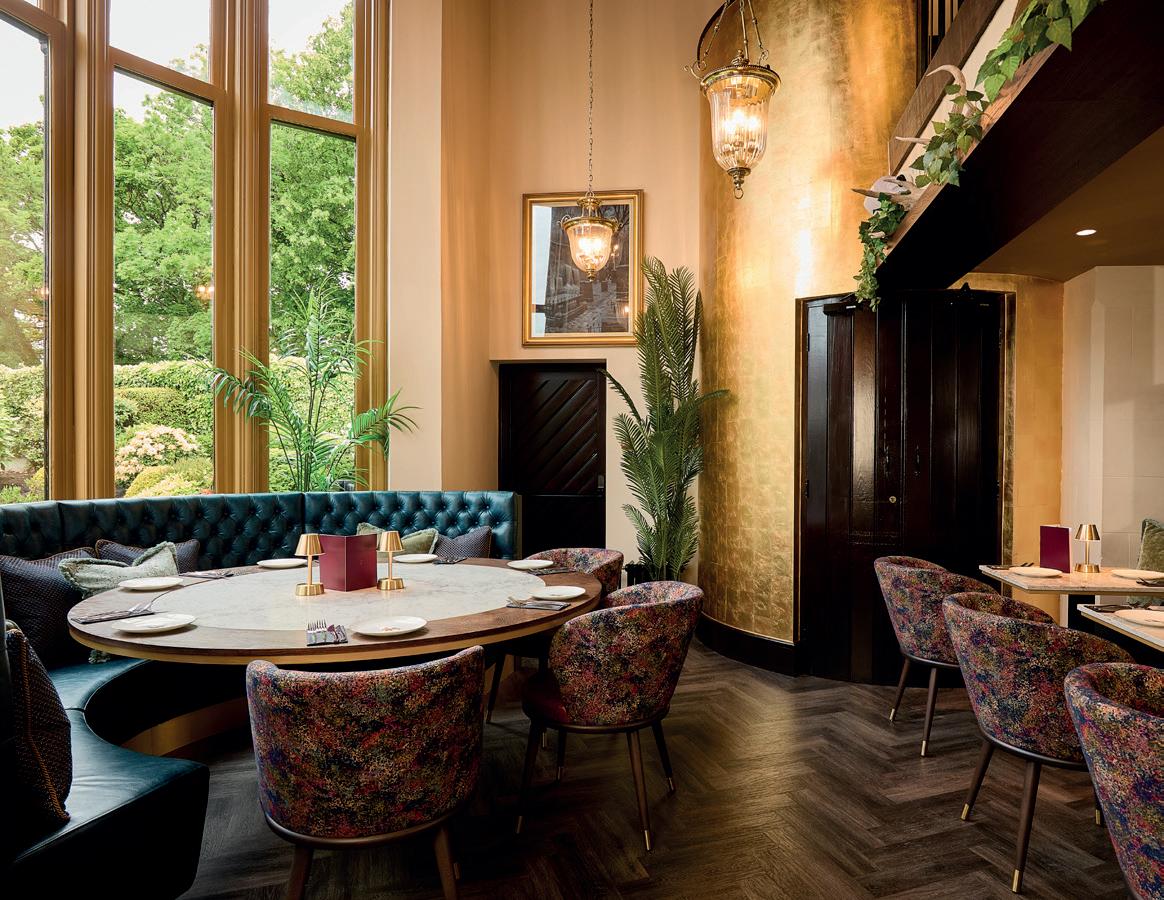
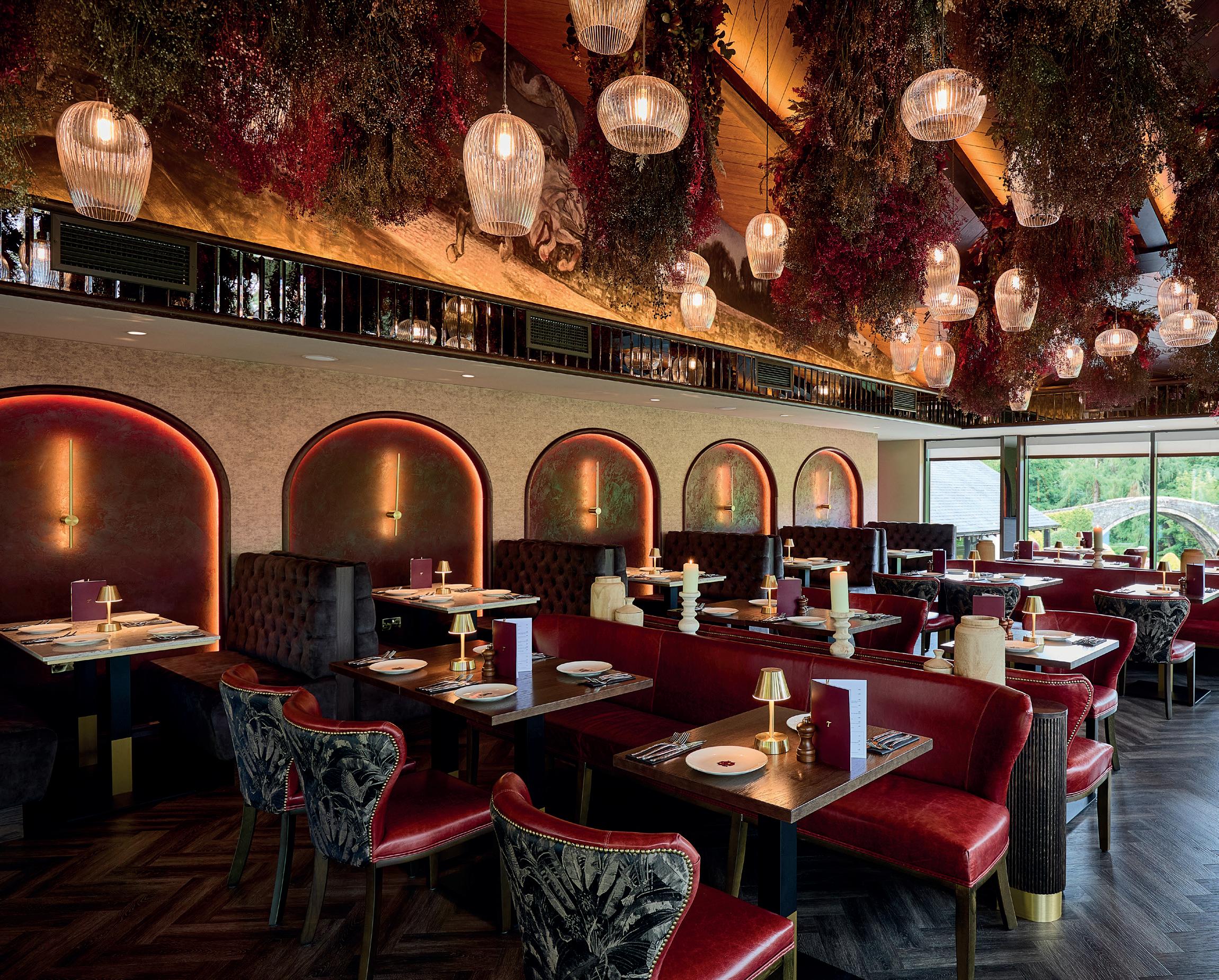
Part of The RAD Hotel Group since 2022, Brig o’Doon House Hotel has undergone a significant and sensitive transformation, culminating in the completion of a newly built wraparound extension. This final phase introduces Tales - a new lounge bar and private dining room - alongside elevated public spaces.
This work brings the restoration full circle. Tales officially opened at the start of June and is now welcoming guests seven days a week from noon until 10pm. The offering focuses on seasonal Scottish cuisine and is framed by sweeping, magnetic views of the iconic River Doon and the gardens below.
As guests enter Brig o’Doon, they’ll find the former Coven restaurant reimagined as an elegant lounge space. A bespoke marble bar is the centrepiece, surrounded by comfortable lounge seating that retains the original monochrome chequered floor tiles - an unmistakable part of the hotel’s design heritage.
Just beyond lies a refined private dining room, offering a discreet space for up to 24 guests , or more intimate semi-private settings with picturesque views for up to 16.
The new 80-cover dining area draws inspiration from old-world libraries, brought to life through a rich palette of earthy tones and burgundy, illuminated with touches of gold. Oxblood leather-backed seating enhances the room’s romantic atmosphere, while walnut parquet flooring and Old English chestnut leather lend warmth and tradition. Custom-designed marble tables ground the space in craftsmanship and add an elegant sculptural quality.
Suspended across the ceiling are signature dried floral chandeliers crafted by Fleur De Galerie, echoing the garden’s trees and the river landscape beyond. These floral installations are paired with hanging glass pendants and structural lighting that together cast an enchanting glow, enhancing the ambience .
Local artworks adorn the walls, culminating in a striking hand-painted Tam O’ Shanter mural
by artist Roderick McKenzie which pays homage to Scottish mythology and Burnsian folklore. Bespoke porcelain plates - each featuring one of six hand-drawn illustration - celebrate the region’s legends and landscapes, including the bloom of a red, red rose, the Auld Brig, dancing witches, and the grand Burns Monument.
Completing the space is a year-round outdoor terrace that offers a tranquil spot for alfresco dining or summer drinks—a seamless extension of the interior’s poetic charm.
Interior design throughout was led by Lucid Interiors in close collaboration with co-owner Vivien Kyle, reflecting a vision where storytelling and aesthetics go hand in hand.
“I wanted Tales to feel like stepping into a storybook. Something rooted in heritage but filled with imagination,” says co-owner of RAD Hotel Group, Vivien Kyle. “Each space feels like its own chapter, from the cosy booths to the visual anchor of the riverside views. The palette, textures, and layout are all about creating little moments of magic.”

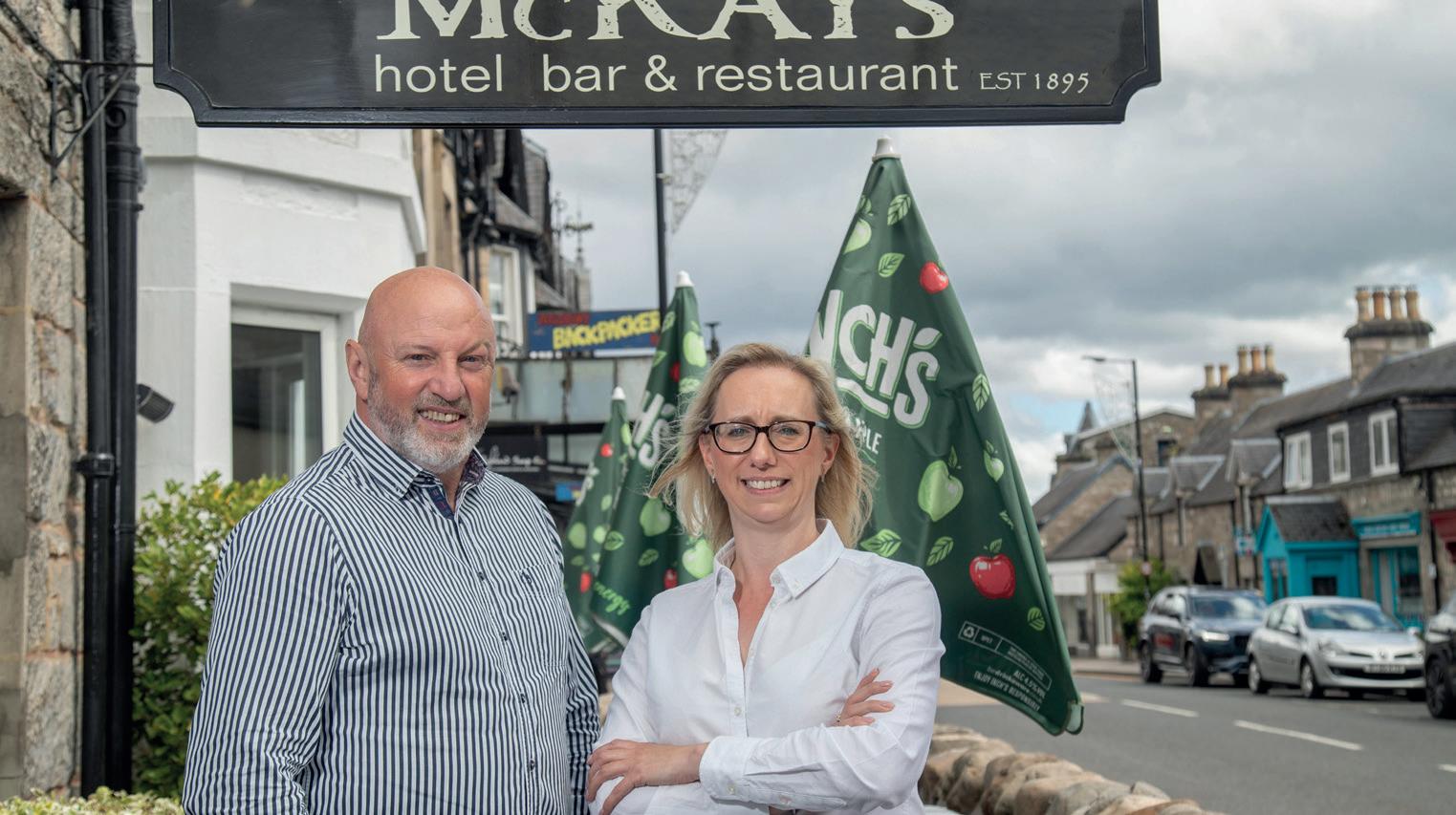
Emerging Highland hospitality group Turas Hotels, formerly J and R Group, has announced a wave of senior appointments as it ramps up expansion and consolidates its presence across Scotland.
The group, which recently acquired Aviemore’s landmark Cairngorm Hotel, has appointed Jennifer Macdonald-Nethercott as Head of Marketing and Johan Van Heerden to the newly created Revenue and Operations Manager role — both key hires aimed at driving brand growth and commercial performance.
Macdonald-Nethercott, who brings 25 years of tourism and destination marketing experience, led the recent rebrand from J and R Group to Turas – Gaelic for “journey”. She will now lead the rollout of the group’s Stay -Discover-Dine’ positioning and customer rewards strategy.
“This is a really exciting position,” said Jennifer. “It’s a privilege to create and develop the look and feel of the brand and to impart the vision to our teams and guests.
“A stay with Turas is much more than just a bedroom. Our properties are offering guests quality food and drink, music and entertainment and experiences such as distillery tours.”
The group operates nearly 80,000 room nights annually across key tourism destinations, including the Boat Country Inn, The Seaforth in Ullapool, Glen Mhor Hotel in Inverness, McKays in Pitlochry and the Uile-
bheist Distillery and Brewery.
In line with its ESG ambitions, Turas has also created a Director of Sustainability post, appointing Victoria Erasmus, who previously led Glen Mhor to global recognition at the World Sustainable Travel and Hospitality Awards**. Erasmus will now implement climate action plans and inclusion policies across the portfolio.
Additional appointments include Delia Keating as Head of Recruitment, Fiona Connor, heading up HR, and seasoned operators Charlotte Sukhraj and Peter Thornton as Group Sales Managers.
A centralised Accounts Team will support financial operations groupwide.
“Through the Turas model, we’re leveraging scale and cross-functional talent to strengthen our offer and promote our hotels under one cohesive brand,” said Director Richard Drummond.
“We knew marketing would have a major role to play moving forward. Jennifer understands the vision and was a natural choice for us.”
Fellow Director Jon Erasmus added, “Having the advantage of scale is definitely the way we see hospitality going.
“Single-site operators are stretched - from compliance and staffing to procurement and HR. By centralising core functions, we allow GMs to focus on the guest experience and quality.”.
Kildrummy Inn in Aberdeenshire has received recognition at the North East of Scotland Chef and Restaurant of the Year Awards when Jay Dickson, one of the inn’s chefs, was named Young Chef of the Year. Aged 22, he has been training under chef-patron David Littlewood and head chef Alex Hay. Judges praised his technical ability, creativity and understanding of flavour.
The inn also took second place in the Restaurant of the Year category, continuing a strong run for the independently owned business, which was named Scottish AA Inn of the Year, received Best Hotel Experience at the Aberdeen City and Shire Thistle Awards, and was listed in The Sunday Times as one of the top ten pubs in the UK earlier this year.
The restaurant also holds two AA Rosettes, and is featured in the Michelin Guide.
David Littlewood said, “We’re incredibly proud of Jay and all that he has achieved - this award shows his hard work, talent and dedication. To also be recognised in the Restaurant of the Year category is a huge honour for the whole team. We are a small operation, but one with huge heart and ambition.”
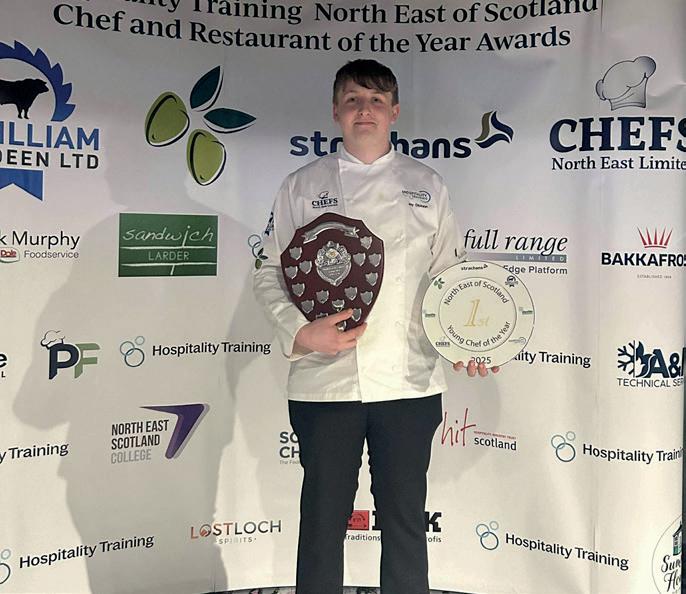


JLC Ventilation & Maintenance provides a variety of services to the hospitality industry.
These


Stainless
Commercial ventilation
Air conditioning
Fans and filtration and Kitchen canopies
With over 25 years of experience, there’s very few that can compete with our high-level of workmanship and we were deighted to be able to assist the Star Hotel with its new kitchen We provided the Kitchen canopies.
For decades, it has been our goal to provide a service unmatched not only in functionality, but appearance. We strive to create sleek, durable additions to your commercial or industrial space that assist in the safety and filtration of your property.


